

DEC. 28TH 2024 ▪ ה"פשת
SHABBAT CHANUKAH & MEVARCHIM




DEC. 28TH 2024 ▪ ה"פשת
SHABBAT CHANUKAH & MEVARCHIM

Chanukah a Short-Lived Festival
Rabbi Baruch Taub Page 76
Where was the Location of Chanukah?
Rivi Frankel Page 84


OU Israel wishes you





RABBI BARUCH TAUB YOM KIPPUR
Rabbi Emeritus, The BAYT Toronto OU Israel Faculty
The economist John Kenneth Galbraith once commented that the definition of a true philosopher is someone who can defend two polar opposite theories and be comfortable with Galbraith was on to something, but he was preceded by Chazon Ish.
In a letter, Chazon Ish comments on the qualifications of a Navi. He quotes Rambam for example who states that Nevu’ah can only be received and transmitted if the prophet is b’simcha. Remarkably that means, comments Chazon Ish, that when Yirmiyahu wrote Eicha he was b’simcha! This counter-intuitive reality highlights the fact that a person has the capacity to live with two contradictory qualities and
In fact a careful reading of the first and second chapters of Rambam’s Hilchot Deot will reveal that this is the proper understanding of the Golden Mean, the middle path in exercising character traits. Contrary to the generally accepted understanding of this central motif that this “middle road” is “moderation” in the classic sense ( not extremely arrogant yet not extremely humble, but somewhere in the middle). Rabbi Menachem Mendel of Kotzk was known to say “A horse walks in the middle of the road not a Jew”.
A proper analysis of Rambam’s halachot will reveal the true understanding of the Golden Mean.
YERUSHALAYIM SHABBAT MIKEITZ ZMANIM CANDLES 4:07 PM • HAVDALA 5:24 PM • RABBEINU TAM 6:00 PM
He can also exercise extreme humility and an embracing love
It is not about a constant positioning “in
Rabbi
Preserving
Rabbi
Rabbi
Rabbi
Rabbi

Insights from the Menorah on How to Pass Down the Mesorah Rebbetzin Zemira Ozarowski
Rav Kook: 8 Chanukah Teachings
Rabbi Aaron Goldscheider
Chanukah Lighting Soon Before Leaving House
Rabbi Daniel Mann
Chanukah a Short-Lived Festival
Rabbi Baruch Taub
How to Know if He is Interested? Aleeza Ben Shalom - Shagririm Balev
Where Was The Location of Chanukah? Rivi Frankel
Olives, Olive Oil and Chanukah Rakel Berenbaum
The first light of Chanukah will be lit Wednesday,
Earliest Kiddush Levana: 3 Days After Molad: 3 Tevet/ Thurs. night Jan. 2
7 Days After Molad: 8 Tevet/ Tues. night Jan. 7
Last Opportunity to Say Kiddush Levana until: 14 Tevet/ Mon. night Jan. 13
IMAGE Photographed by Moishie Strickoff
Hi! I am a 15 year-old yeshiva Bachur from Beit Shemesh. My family and I made Aliyah from Queens, NY in 2019. This is one of the many pictures of my father’s menorah that I take every year. To me, it expresses the light shining through, and expelling the darkness. Showing that even in these dark times the light continues to shine bright. A FREILECHIN CHANUKAH!
Yerushalayim/Maale Adumim
Aza Area (Netivot, Sderot et al)
Beit Shemesh/RBS
Alon Shvut
Raanana/Tel Mond/Herzliya/K.Saba
Modiin/Chashmonaim
Be’er Sheva
Ginot Shomron
Haifa / Zichron
Gush Shiloh
Tel Aviv / Givat Shmuel
Givat Zeev
/ Kiryat Arba
Tzfat / Bikat HaYarden
Rabbeinu Tam (Jerusalem): Mikeitz - 6:00PM • Vayigash - 6:05PM
All Times According to MyZmanim (20 mins before Sunset in most Cities; 40 mins in Yerushalyim and Petach Tikva; 30 mins in Tzfat and Haifa)
All Times According to MyZmanim (20 mins before Sunset in most Cities; 40 mins in Yerushalyim and Petach Tikva; 30 mins in Tzfat and Haifa)
Coast OU Press Synagogue/Community Services OU Advocacy OU Israel
MITCHEL R. AEDER, PRESIDENT OF THE ORTHODOX UNION Yehuda Neuberger, Chairman of the Board, Orthodox Union | Dr. Josh Penn, OU Kashrus Commission RABBI MOSHE HAUER, EXECUTIVE VICE PRESIDENT | RABBI JOSHUA M. JOSEPH, ED.D. EXECUTIVE VICE PRESIDENT & CHIEF OPERATING OFFICER Rabbi Dr. Tzvi Hersh Weinreb, Exec. V.P. Emeritus OU KOSHER: Rabbi Menachem Genack, CEO/Rabbinic Administrator OU Kosher | Rabbi Moshe Elefant, COO/Executive Rabbinic Coordinator ISRAEL: Rabbi Yissachar Dov Krakowski, Rabbinic Administrator | Rabbi Ezra Friedman, The Gustave and Carol Jacobs Center for Kashrut Education/ Deputy Rabbinic Administrator Headquarters: 40 Rector St. 4th floor, New York, NY 10006 212-563-4000 website: www.ou.org
Editor Emeritus: Phil Chernofsky
Editor: Rabbi Aaron Goldscheider | aarong@ouisrael.org
Advertising: Ita Rochel | 02-5609125 or ttads@ouisrael.org Website: www.torahtidbits.com
Not getting enough TTs? Too many? None at all? Contact our DISTRIBUTION 050-577-2111 • ttdist@ouisrael.org
JERUSALEM
JERUSALEM
Ranges 11 days Wed–Shabbat
Ranges 11 days Wednesday - Shabbat
Oct x–x / x–x Cheshvan
Dec. 25 - Jan. 4 / 24 Kislev - 4 Tevet
Earliest Tallit and Tefillin x:xx–x:xx
Earliest Tallit and Tefillin 5:42-5:45 Sunrise 6:37-6:39
Sof Zman Kriat Shema 9:08-9:12
x:xx–x:xx Sof Zman Kriat Shema x:xx–x:xx Magen Avraham x:xx–x:xx
Sof Zman Tefila x:xx-x:xx (According to the Gra and Baal HaTanya)
Magen Avraham 8:29-8:33
Sof Zman Tefila 9:58-10:02 (According to the Gra and Baal HaTanya)
Chatzot (Halachic Noon) x:xx–x:xx
Chatzot (Halachic Noon) 11:39-11:44
Mincha Gedola (Earliest Mincha) 12:09-12:14
Mincha Gedola (Earliest Mincha) x:xx–x:xx Plag Mincha x:xx–x:xx
Sunset (Including Elevation) x:xx–x:xx
Plag Mincha 3:38-3:45
Sunset (Including Elevation) 4:46-4:52
Seymour J. Abrams • Orthodox Union Jerusalem World Center • Avrom Silver Jerusalem College for Adults • Wolinetz Family Shul • Makom BaLev • Birthright • Yachad • NCSY in Israel • JLIC in Israel • Camp Dror • Pearl & Harold M. Jacobs ZULA Outreach Center • The Jack Gindi Oraita Program • OU Israel Kashrut
STUART HERSHKOWITZ, PRESIDENT OU ISRAEL Zvi Sand / Yitzchak Fund: Former Presidents, OU Israel | Rabbi Emanuel Quint z”l, Senior Vice President | Prof. Meni Koslowsky, Vice President VAAD MEMBERS:
Michael Elman | Yonatan Frankel | Yitzchak Fund | Daniella Hellerstein | Stuart Hershkowitz | Jeremy Lustman | Meir Raskas | Atara Reichel | Zvi Sand | Norman Schmutter | Mark Schneider | Esther Williams RABBI AVI BERMAN, EXECUTIVE DIRECTOR, OU ISRAEL
David Katz, CFO, OU Israel | Natan Kandler, COO, OU Israel | Chaim Pelzner, Director of Programs, OU Israel | Rabbi Sam Shor, Director, Torah Initiatives, OU Israel | Rabbi Sholom Gold zt"l, Dean, Avrom Silver Jerusalem College for Adults 7 Hartum Street, Jerusalem, 9777507 phone: (02) 560 9100 | fax: (02) 561-7432 email: office@ouisrael.org website: www.ouisrael.org
Founders and initial benefactors of the OU Israel Center: George and Ilse Falk a"h
Torah Tidbits and many of the projects of OU Israel are assisted by grants from THE JERUSALEM MUNICIPALITY

OU Israel, Torah Tidbits does not endorse the political or halachic positions of its editor, columnists or advertisers, nor guarantee the quality of advertised services or products. Nor do we endorse the kashrut of hotels, restaurants, caterers or food products that are advertised in TT (except, of course, those under OU-Israel hashgacha). Any "promises" made in ads are the sole responsibility of the advertisers and not that of OU Israel, the OU Israel Center , Torah Tidbits.

RABBI AVI BERMAN EXECUTIVE DIRECTOR, OU ISRAEL ABERMAN@OUISRAEL.ORG
Rabbi Avi Berman Executive Director, OU Israel
When we were still in our old building on Keren Hayesod street, I had a routine at the end of the workweek. I would leave my office and come down to the main floor, where I would make sure to hear the busy voices of our Yachad participants enjoying their Yachad Hub program. Seeing and hearing such special young adults all gathering to do an activity together with an incredible staff and volunteers was always such a joy for me. Whether it was making candles for Chanukah, planting plants for Tu B’shvat, or learning about different locations, it always warmed my heart to leave the building knowing that something so impactful and meaningful was going on inside. It is very meaningful to me that Yachad is continuing their bi-weekly Hub in our new location/ I am someone who used to struggle to connect to individuals with special needs, and I thought it took a certain personality. But then I met my wife’s brother, who has special needs. The highlight of my week is when we go to shuk Machaneh Yehuda together on Fridays, and judging by his excited phone calls confirming that we’re going, I know it's a highlight of his
OU Israel mourns the passing of our long-time faculty member
Rabbi Aharon Ziegler zt”l
week as well. Through my brother-in-law, I learned how gigantic their hearts are. How our special needs population is so full of joy and smiles.
My brother-in-law is Israeli and doesn’t speak English. There are several amazing organizations in Israel for special needs Hebrew-speakers, and he has gained tremendously from them. Yet, seeing how much fun is being had at our Yachad events, I keep saying to my wife, “I wish your brother could come to Yachad!”
Now that we have moved to our new OU in Israel headquarters in Har Hotzvim, the dynamic of the office has changed drastically. Instead of being on five floors of a small building, we are on one floor of a large building. Everyone sees each other in the coffee room, or on their way from meeting to meeting, and the social aspect of the office has grown considerably and for the better.
Perhaps the greatest part of our new space is that offices and rooms surround one big hallway where my staff and I can easily be aware of the myriad of staff and activity taking place. Recently, Yachad held their annual Giving Day fundraiser, with a fundraising goal of $50,000 (they ended up raising $60,000!), that took place in our headquarters. It was truly beautiful seeing the Yachad participants, volunteers and staff all gather together from early in the morning to late at night, every one of them calling and texting friends, family, and supporters, asking them to help raise the funds necessary to continue to give these special individuals such a meaningful and much needed program.
The way in which Sima Kelner, Yoel Sterman,
David Oratz and the entire amazing Yachad staff ran the fundraiser was an incredible sight to see. For example, this year Yachad started a new Yachad Teen Program, and they brought in their “teen mainstreamers” who have been involved in Yachad activities this year to create a team and raise money to expand the Teen Program. In addition to raising necessary funds, these teens brought incredible ruach and energy. So many Yachad staff, former and current, came to bring excitement, cheer and help out any way they could. It was really such an amazing Giving Day.

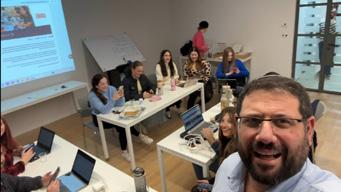
After the fundraiser, I flew to America as part of our final OU Israel fundraising campaign before the end of the fiscal year. Approximately, 30% of all donations to nonprofit organizations are made in December, and among those, almost half are given in the last week of December.
Baruch Hashem, we have many partners and supporters who believe in the mission of OU Israel and help fund OU Israel activities and programs throughout the year. Nevertheless, in order to continue to run and expand our many programs we need to increase our fundraising - הרות
. As you consider your charitable donations now and throughout the year, let me take this opportunity to call upon you, dear reader, to help us in our work with at-risk Israeli teens and supporting the English-speaking community in Israel. Whether it’s for Yachad, NCSY, JLIC, our incredible Beit Midrash programs and its many shiurim given by top-notch educators, our Women’s Division and weekly Women’s Hub, the work we do providing critical support in our Teen Centers across the country, and much more - we rely on people like you who give from your hearts
to support us.
Please consider giving to OU Israel. We are growing, coming to new communities, reaching out to more English-speakers across the country, while running all the incredible current programs you have come to know and love, including Torah Tidbits. We cannot continue to do so without your support. Please enable us to be your messengers in doing good for the Jewish people by visiting ouisrael.org/donate or emailing me at aberman@ouisrael.org .
Wishing you all an uplifting and inspiring Shabbat,

Rabbi Avi Berman Executive Director,
OU Israel aberman@ouisrael.org
Condolences to Shelley Dayag and family on the passing of her Mother a”h








Great opportunity to buy in a New Building starting construction in Arnona close to Baka: Great prices and the price isn't linked to inflation!
For Sale in Neve Yakov, Moshe Sneh street: Spacious 3 rooms, renovated, A/C, 3rd with views, next to a large park and Shul, 1.79m NIS
Last 2 room unit in a Great New Building 50m + 8m meter mirpeset. Occupancy in 4 months! Only 2.15m NIS


















OU EXECUTIVE VICE PRESIDENT
In his account of the story of Chanukah, Rambam (Laws of Megillah and Chanukah 3:1) chooses to accent an element of the triumph over the Greeks – the restoration of Jewish sovereignty - not previously noted in the Talmud’s telling of that story:
“The sons of the Hasmoneans, the High Priests, overcame [them], slew them, and saved the Jews from their hand. They appointed a king from the priests, and sovereignty returned to Israel for more than 200 years, until the destruction of the Second Temple.”
That period of Jewish sovereignty was not all that Jewish and not all that sovereign. Many in the parade of kings that led us during that period were violent and unfaithful to Torah tradition, one of them going so far as to slaughter virtually all the members of the Sanhedrin. Additionally, they were often client kings and even puppets of the Greeks and then of the Romans. Yet, Rambam considers even this diminished and distorted form of Jewish sovereignty a cause for celebration. Why?
Concurrent with the reign of these kings, a different challenge was brewing, one that
Rambam (Laws of Prayer 2:1) characterizes as our most critical issue, the emergence within the Jewish people of heretical movements. These were the years of the rise within the Jewish community of the growing movements of the Sadducees, the Boethusians, and eventually the Christians, all of whom rejected core faith principles of Judaism including the divine origin and eternal truth of both the written and oral Torah. It was in this context of general religious decline that Rambam celebrated the restoration of even a diminished Jewish sovereignty. Why?
Rambam (Book of Mitzvos, Positive Mitzvah 173) saw the unification of the nation as the principal task of the king. While the king was commanded to constantly carry a Torah scroll and abide by all the instructions of the Torah and the prophets, setting the people on the path of faith and virtue, he primarily served as the rallying force of national identity. As Rambam noted elsewhere (Laws of Teshuva 3:11), sideby-side with faith and religious observance there is critical importance to identifying with the nation and the fate of the Jewish people.
In that two-hundred-year period of religious weakness during which the unifying power of faith and observance was in retreat, the emergence of even a diminished form of Jewish sovereignty was a saving grace for our people. While before the Chanukah triumph the Hellenized Jews were abandoning their faith, their observance, and their Jewish identity, the divine miracle of the restoration of Jewish sovereignty allowed the next generations of the
and our next step will be to plant a fruit tree. I never thought of myself as being the agricultural type, but the feeling of settling and planting a portion of Eretz Yisrael, has been truly euphoric. Iy”H, when we plant our tree, and eat the fruits that will grow one day, I think we will be able to truly appreciate that unique Kedusha found in the fruit of Eretz Yisrael!
religiously disconnected to retain at the least a national identity with the Jewish people. Bayamim haheim bazman hazeh. This miracle has repeated itself in our time. The weakened commitment of wide swaths of the Jewish people to faith and observance has led to widespread Jewish disaffiliation. And just as in the days of the Chanukah miracle, G-d in His ultimate kindness and eternal commitment to our people gave us a pathway to a solution. In the void created by weakened religious connection, G-d placed a new and riveting anchor of Jewish identity, the reborn sovereign Jewish State of Israel. Millions of Israelis with little knowledge and observance of Torah nevertheless identify completely with the nation and the fate of the Jewish people.
To conclude, when you buy your Tu B'shvat fruit this year, don’t search for those dried apricots and banana chips imported from Turkey. Rather, head over to the fresh produce and buy yourself some nice juicy Kedusha-filled Jaffa oranges and thank Hashem for bringing you to this land in order to be able to הבוטמ עבשלו הירפמ לוכאל, imbibing that Kedusha in every bite that you take!!
The State of Israel has played a similarly critical role for the wide swaths of diaspora Jewry disconnected from Torah. Concern for Israel and pride in its accomplishments have united and galvanized American Jews and served as the most effective anchor of broad Jewish connection. Though there is a growing trend of American Jews to whom Israel has tragically and misguidedly become a source of embarrassment, modern Israel continues to be an effective tool of engagement for synagogues, federations, schools, and camps; Birthright Israel and MASA have developed the Israel experience as the ultimate vehicle to inspire a journey to fuller Jewish identity.
All of this has only increased since Simchat Torah/October 7, and has not only strengthened national identity, but has gone further to fuel a surge in interest in Torah learning and observance. Thus, once again, in a modern-day version of the Chanukah miracle, the restoration of Jewish sovereignty has served as a critical anchor of Jewish identity for Jews everywhere.




Bricks
Bricks
Bricks tone specializing in safety deposit vaults is opening its new branch to residents of Jerusalem and surrounding areas in the Clal Building. At your service are safety deposit boxes of various sizes to s tore your valuables. The center is secured 24/7 at the most stringent international standards. The location and boxes are secured by Lloyds International.










Rabbi Reuven Tradburks
RABBI REUVEN TRADBURKS
RCA ISRAEL REGION
RCA Israel Region
Yosef ascends from jail to complete control of Egypt. Paro has a dream. The Butler remembers Yosef in jail. Yosef tells Paro of 7 impending years of plenty followed by 7 of famine. Yosef is appointed to manage the hoarding of food in the good years. When the famine begins, the whole world turns to Yosef for food. Including his family. Yosef recognizes his brothers; he accuses them of spying. Shimon is kept in jail, the brothers return home to bring Binyamin. When the need for food forces them back to Egypt, Binyamin is brought with them. Yehuda guarantees his return to Yaakov. Yosef plants his goblet with Binyamin, punishes him with remaining a slave in Egypt.
2 years later (after the Butler’s return to serve Paro), Paro dreams. 7 healthy cows emerge from the water, devoured by 7 skinny ones who emerge after. 7 healthy stalks are devoured by 7 parched ones. Paro is not satisfied by the dream interpretations of his wise men. The Butler remembers Yosef, telling Paro of him. Yosef is shaved, dressed and rushed to Paro.
Condolences to R’ Aaron & Miriam Botzer and family on the untimely passing of their son
Dreams aplenty. Yaakov dreamt of the ladder and the angels. Yosef had 2 dreams. The Butler and Baker had dreams. Now Paro has 2 dreams.
But there are subtle differences in who, when and how many. Yaakov had one dream: 1 man, 1 dream, 1 night. Yosef had 2 dreams, but not on the same day; 1 man, 2 dreams, 2 nights. The Butler and Baker; 2 men, 2 dreams, 1 night. And Paro; 1 man, 2 dreams, 1 night.
When Yosef is successful in interpreting both the Butler and Baker and Paro’s dreams, does he wonder about his dreams? Does he think his dreams may still come true? Or does he assume his don’t match the pattern; the others were 2 dreams, one night. His were 2 dreams, 2 nights. Or perhaps 2 nights is a sign that they will take a long time to occur. Maybe even over 20 years.
Paro relates the dreams to Yosef. Yosef tells Paro that the 7 years of plenty will be followed by 7 years of famine. Now, Paro you shall appoint a wise person to hoard food during the plenty, to avoid the lands collapse during the famine. Paro responds: could one like this be found who has G-d’s spirit in him?
Dream interpretation is a rich subject. If the dream is of plenty and famine, I get healthy stalks being devoured by sickly ones. But stalks don’t eat. And what do cattle have to do with agriculture? Why cows walking out of the Nile? Ok, cows can eat each other, whereas stalks can’t. But stalks are agriculture, cows aren’t.
The name Elokim appears 7 times in this exchange between Yosef and Paro. When a word is repeated 7 times, it is a signal – take
note, this is central. The story of Yosef’s sale, his descent to Potiphar’s home, his being framed by Mrs. Potiphar, thrown in jail, is a downward spiral designed by the hands of man. But all that is about to change, for G-d’s Hand is entering the story.
ALIYA (41:39-52)
Paro appoints Yosef over all of Egypt; he receives the signet ring, the royal clothes, rides the royal chariot, receives the Egyptian name Tzafnat Paneach and marries. He gathers the grain in the years of plenty. His 2 sons are born; Menashe, G-d has allowed me to forget my father’s home and Ephraim, G-d has made me prosper in Egypt.
In an instant, Yosef has gone from the foreign lad in jail, to the number 2 man in the land. But. The wrong land. Aren’t we supposed to be settling the Land of Israel? In our absorption in a wonderful story of twists and turns, we forgot that the story of the Torah is the promise to Avraham: Your children will inherit the Land. Of Israel. Not Egypt. The shift of the story of the Jewish people has moved entirely from Israel to Egypt right under our noses.
And don’t we all love the Midrash that the Jews were redeemed from Egypt for not changing their names, their clothing or language. Yosef is given new clothes, and a new name in a new language. Yosef seems to have become the quintessential Egyptian.
4TH ALIYA (41:53-42:18)
The famine begins. Paro instructs his people to go to Yosef, for Yosef has opened the storehouses. Yaakov sends his sons, save Binyanim, to Egypt to get food. When the brothers bow to Yosef, he recognizes them. He remembers his dreams. Yosef challenges the brothers, claiming they are spying Egypt. To prove they are not, he demands they bring Binyamin. And puts them in jail for 3 days.
What did Yosef think when he saw the brothers? All the commentators grapple with Yosef’s response. Why not say hello to them? Why hide? Varied are the responses. But on the level of metaphor or drush – what an image. The Jew, successful, wildly successful, in the highest offices of his new land, with his new language, his new name, his new clothes; is unrecognizable to his brothers. And he himself, so comfortable in his new world, cannot find the words to bridge the gap.
5TH ALIYA (42:19-43:15)
Yosef tells the brothers that one should stay behind while the rest return home and bring Binyamin to him. They respond to themselves; this has occurred because of how we treated Yosef. Yosef cries upon hearing this. Shimon is jailed. Yosef places their money with their grain. When they discover this, they wonder why G-d is doing this. Yaakov is distressed at the thought of Binyamin leaving him. But when the food runs out, there is no choice. Yehuda guarantees Binyamin’s safe return. They return and stand before Yosef.
The brother’s feelings of guilt for the sale of Yosef seem to persist even 20 years later. Over 20 years later, in Egypt, buying food – when things turn into a crisis, with Yosef demanding they bring Binyamin, the brothers immediately blurt out: we are getting our due for selling Yosef. They have been waiting for calamity to befall them, knowing it will surely come. But of course, they mean this is G-d meting out a form of punishment to them. When really, it is Yosef who is manipulating them. So, it isn’t G-d, it’s Yosef. Or is it? Maybe they are right. Yosef is repeatedly described as successful in Egypt; in Potiphar’s home, in the jail, and now as number 2 in the Land. He is efficient and definitive. Yet, here, he is capricious; puts them all in jail, says they should all remain in jail and
one return, then changes his mind, one stay in jail, all return. Either Yosef is beside himself and winging it, not really knowing what to do. Or maybe the brothers are not the only ones being manipulated. Maybe Yosef too is a puppet in the Divine Hands – he makes a move, and He puts into his head something different. In order to bring the Jews to Egypt.
6TH ALIYA (43:16-29)
The brothers receive a royal welcome from Yosef upon their return with Binyamin. They apologize for the money they found in their grain sacks. Yosef tells them not to worry for their G-d has given them a gift. The brothers are treated to a fine dinner. Yosef inquires of their father and sees Binyamin.
Binyamin is Yosef’s brother, the only other born from Rachel. Binyamin was very young when Yosef was sold. This is 22 years later. Yosef would not recognize Binyamin. The aliya ends on a pregnant note – he sees Binyamin – and then what? The next aliya begins with Yosef crying. Yosef does a lot of crying in the story. At the same time, for the brothers, they swing up and down. Nervous as to how he will react. Relieved at the banquet he serves them. But then crashing down when in the next aliya the goblet is planted with Binyamin.
7TH ALIYA (43:30-44:17)
Yosef sits the brothers in the order of their birth. They are surprised. Their sacks are packed with grain, their money returned. And Yosef’s goblet is planted in the sack of Binyamin. No sooner had they left, Yosef orders the guards to pursue. The goblet is found in the sack of Binyamin. They return to Yosef. Yehuda offers that they all stay as slaves. Yosef demurs; the thief alone shall be a slave. The rest of you return home in peace to your father. The swing of fortune of the brothers is
dramatic. Accused of being spies, yet their money returned with their grain. Treated royally upon their return, money again returned with their grain. Yet, accused of theft. And the stage is set for an even more dramatic swing: Yosef finally revealing himself to them.
ZECHARIA 2:14 - 4:7
The special haftorah for Chanukah contains the glorious vision of the golden Temple Menorah.
This hafotrah’s unique message was prophesied by Zecharia in close proximity to the building of the second Beit Hamikdash. Within this context this exquisite passage describes the exuberant joy that will prevail when Hashem’s presence returns to Yerushalayim.
Hashem, in Zecharia’s prophecy, proceeds to articulate the great reward awaiting Yehoshua, the first Kohen Gadol to serve in the second Beit Hamikdash, if he and his descendants follow the ways of the Torah. The reward will be: “Behold! I will bring My Servant, the Shoot.” This is an allusion to the Mashiach, the ‘shoot’, the descendant of David.
Zecharia then powerfully witnesses in his mind’s eye a golden seven-branched Menorah. An angel offers an explanation of the vision: “This is the word of the Lord to Zerubbavel‘Not by force and not by physical might, by my spirit,” says the Lord of Hosts.”
With these words the Navi conveys a message of hope and the promise that the redemption will surely arrive. The light off the Menorah is a symbol of God’s shechina, His holy presence, that will soon be manifest in the land of Israel and will ultimately be visible for all humanity to behold. May that day come soon!
been memorialized in a popular song, "An eternal people does not fear the long and arduous path."
Doris Weinberger a"h
Max Weinberger z”l
10th of 54 sedras; 10th of 12 in Bereshit. Written on 254.6 lines, ranks 6th.
Greatly missed by their children, grandchildren and great grandchildren
Rav Aryeh and Dvora Weinberger
Bernie and Leah Weinberger Menachem and Hannah Katten
Mikeitz is a one parsha petucha (open) (the longest parsha in the whole Torah). Contrast this parsha’s 2022 words with the shortest parshiyot with 2 words.
146 pesukim - rank: 8th (5th in Bereishit) tied with Bereishit (the sedra).
2022 words - ranks 3rd (2nd).
Patience is necessary for those who follow Isaac's way. But a wise woman taught us that patience is but another name for hope. That woman was Jane Austen, who put these words into the mouth of one of the characters in her great novel, Sense and Sensibility: "Know your own happiness. You want nothing but patience—or give it a more fascinating name: call it hope."
7914 letters - ranks 2nd (first).
In observance of the Shloshim of our friend Yehuda Leib Berren z"l
Mikeitz’s pesukim are unusually long for a big sedra. That’s why it is so high in the rankings for words and letters. On the other hand, with no parsha breaks, the “number of lines rank” drops a bit.
Rav Menachem Weinberg will give a shiur in his memory "Heroic Joy"
Monday evening, 23 November/ 8 Kislev 7:30pm
1558 words - ranks 24th. MITZVOT
Zoom Meeting: 853 8980 1519
Password: Yehuda
No mitzvot are counted from Mikeitz. One of 17 sedras without mitzvot

shmuelnathan4@gmail.com
BY RABBI CHANOCH YERES RAV, BEIT KNESSET BEIT YISRAEL,
“And he took Shimon from among them” (42:24) - )דכ:במ(
Why did Yosef, as Viceroy of Egypt, specifically take Shimon?
Rashi (1040-1105, France), quoting the Midrash Rabbah, attributes the idea of throwing young Yosef into the pit, to Shimon. Therefore, Shimon was chosen to be placed in prison in Egypt, Middah Keneged Middah. An additional reason given by Rashi was that Yosef wanted to separate Shimon from Levi who had already proven as a dangerous pair in the past, so they should not take counsel together to kill Yosef.
The Meshech Chochmah (Rabbi Meir Simcha from Dvinsk 1843-1926) quotes the Mishna (Yerushalmi Terumot 8:4) that if a community is threatened to provide a victim from amongst them, they may not choose one individual, rather all must submit themselves. Yosef had asked the brothers to choose one amongst themselves to stay as collateral, placed in prison (42:19). The brothers refused to single out one brother, thereby forcing Yosef to choose for himself. This situation awoke the brothers to their previous treatment of Yosef, Middah Keneged Middah. During the sale of Yosef, they victimized one of their brothers, refusing to listen to his cries, so too now they had to experience one of them being chosen as the victim in place of their entire group. This emphasized to them for their wrongdoing at the sale of Yosef.
Shabbat Shalom


BY RABBI DR. TZVI HERSH WEINREB OU EXECUTIVE VICE PRESIDENT, EMERITUS
BY RABBI DR. TZVI HERSH WEINREB OU EXECUTIVE VICE PRESIDENT, EMERITUS
It is only in recent years that individuals in important public roles wore special garments. Kings and queens wore royal garb, important government figures wore top hats, and judges wore black robes and wigs. In those now bygone days, the adage “clothes make the man” may have had some truth. Things are different nowadays.
But what about in biblical days? Was there any special significance to the clothing that one wore? Did a specific uniform have any bearing upon one’s role in family or society? Did a new position in life require a new set of clothing? More to the point, did a change of garb portend a change in personal character?
To deal with these questions, let us consider
In loving memory of Jules E Coven
on his 8th Yahrzeit
Loving husband of Dorothy Coven father of Michele Coven Wolgel grandfather and great grandfather
Wolgel, Montag, Coven, Jacobi and Amit families
some of the verses in this week’s Torah portion, Miketz (Genesis 41:1-44:17), along with some verses in earlier and subsequent parshiot, beginning with last week’s Torah portion, Vayeshev.
There we find perhaps the most well-known wardrobe item in the entire Tanach, Yosef’s multicolored robe: “And Yisrael [Yaakov] loved Yosef more than all of his sons and made for him a ketonet pasim, a magnificent robe (Genesis 37:3).”
For the brothers, of course, this was an unbearable insult, indisputable evidence of Yaakov’s favoritism. Their hatred for Yosef ensued and the rest is history. Our Sages warn all parents against favoring one child over another and point to Yaakov’s special treatment of Yosef as an example of the dangerous consequences of parental favoritism.
Soon enough, the brothers strip Yosef of his gorgeous robe, dip it into goat’s blood, and send it to Yaakov as evidence that Yosef met his death in the jaws of some wild beast. What effect did this have upon poor Yosef? Surely, he was emotionally impacted by the loss of the symbol of his father’s special favor, and surely, he was panicked by his brother’s actions—throwing him into a pit full of snakes and scorpions and then removing him from the pit to sell him to a passing caravan heading to Egypt. However, we have no record in the biblical text of his reaction to his predicament.
The next thing we know is that Yosef is sold into slavery under a prominent Egyptian, Potiphar, whom he impresses favorably and is thus appointed the chief butler of Potiphar’s
household. Potiphar’s wife attempts to seduce Yosef, but he refuses to submit to her and flees the premises. As he struggles to extricate himself from her pleas, she grasps his beged, presumably his outer garment, and he escapes but abandons his garment in her hands.
And so, we learn of another of Yosef’s garments. But we are left wondering whether this garment had any special significance for Yosef, nor do we know his reaction to its confiscation. We soon learn, however, that Mrs. Potiphar uses her possession of Yosef’s garment as evidence to demonstrate to her husband that Yosef tried to seduce her.
This unnamed, and probably very ordinary, garment now becomes quite important. It is the item that condemns him to lengthy imprisonment in the royal dungeon. Here he certainly wears special garments, namely those of an imprisoned criminal.
I’ll leave for you, dear reader, to read the dramatic narrative which takes place in the prison, and which eventuates in Yosef’s freedom and invitation to meet the Pharoah and interpret his dreams. At this point, we can only assume that Yosef is still in his prison uniform.
Pharoah responds immediately and orders that Yosef be brought to him posthaste. “He rushed him out of the dungeon; he shaved, changed his garments, and came to Pharoah (Genesis 41:14).” Note, garments are mentioned here again.
Yosef more than meets Pharoah’s expectations. His dreams are interpreted, a detailed plan is provided him by Yosef which will cope successfully with the dire predictions of the dreams, and Pharoah exclaims, “There is no one as sagacious and as wise as you.” Pharoah appoints Yosef as his viceroy, places his ring on Yosef’s hand, and dresses him in linen garments before gifting him with a gold necklace
and a befitting chariot. Note well, garments again!
What lessons do our commentators find in this series of articles of clothing and their role in Yosef’s development from spoiled adolescent to, in his many transitions, slave boy to a young man who can withstand seduction to a jailed criminal to a well-groomed guest of the mightiest king of his time, and ultimately to the second in command of a mighty empire.
I will share but two such commentators, one from the modern period and one from very early medieval times. I begin with the words of Rabbi Avraham Bornstein, the Chassidic leader of Sochachov and brilliant author of Avnei Nezer. He comments on the verse in which Yosef is first freed and immediately shaves and changes his clothing:
“It can be said that Yosef was in no way changed, heaven forbid, by this episode. He remained the same principled and committed person that he always was. His new garb left no trace of arrogance in him. One would think that ‘shaving’ and ‘changing his garments’ would have altered his character, but that did not occur. Thus, Rashi comments that he groomed himself because of kavod malchut, proper courtesy to royalty.”
His new garb did not affect his ego at all. It was merely the “right thing to do.” And so, the Sochachover Rebbe concludes:
“This a lesson for us all. Even when we are promoted to positions of greatness, we must remain who we were. We must remain committed to our previous values. As the great Chassidic master of Pesishcha (mentor of the Sochachover) would teach on the verse (Deuteronomy 28:2), ‘All these blessings will be delivered unto you and reach you;’ that is, you will be granted blessings if they reach the authentic you, but not if you artificially play
the part of another.” (This passage from the Sochachover can be found in the collection known as Neot HaDesheh, volume 2, p. 319).
Long before the Sochachover, we find a comment by Rashi with a very similar message. It appears in his commentary to Shemos (Exodus 1:5). The verse lists the sons of Yakov who emigrated to Egypt and concludes, “and Yosef was in Egypt”. Rashi asks, “Do we not already know that Yosef was in Egypt?” He responds, “This is so that we shall know of Yosef’s righteous character. The same Yosef who tended his father’s sheep as a youngster was the mature Yosef who was a king’s proxy in Egypt, steadfastly adhering to his principles.”
Do “clothes make the man”? It seems that the Torah teaches us otherwise. Clothes are only pieces of cloth. One’s authentic identity gives clothes either glory or ignominy: the man makes the clothes, not the other way around.

www.angelrealty.co.il
For Sale in Jerusalem
Ramot B: * 8 room cottage with option, stunning view
5.090.000 NIS
HolyLand Project: * Stunning 5 room apt. 4.690.000 NIS
For Sale in Efrat
Dagan: * Special house with pool, 240m. Large outdoor area, 2 parking spots. 7.190.000 NIS
Zayit: * 3 room apt. (near Shirat David) 2,175,000 NIS
Zayit:* 5 room garden apt. 157m 4.190.000 NIS

Gabi- 0524588716



TALBIEH - Private Land:
TAMA 38: 4 Rms, 128 sqm (incl. MB en suite), balcony, Shabbat elevator, Old City view!
Occupancy: February 2026.
Price: NIS 65,000 per sqm.
RECHAVIA
*Duplex! 5 bdrms, 25 sqm kitchen, succah, shabbat elevator, 2 parking, storage.
NACHLAOT / CITY CENTER
*2 rms, priv. entr. storage room, NIS 2,190,000
*2 One bedroom apartments, renovated, purchase together or separate, shabbos elevator, view!
OLD KATAMON


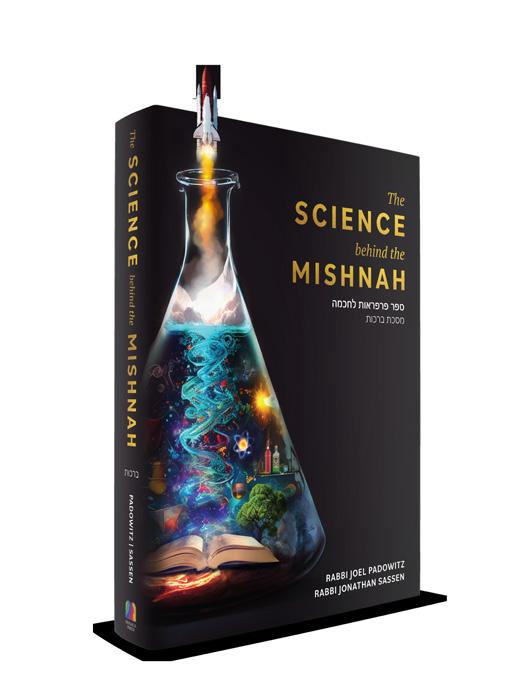


RABBI DR. AKIVA TATZ


Diplomate of Oral Implantology
Faster, Easier and Better than ever before.
Come and get a second opinion, if you were told you need:
Bone grafts or sinus lifts Cutting and stitching Months without teeth Not enough bone (These can usually be avoided today)
Almost always with less pain and less swelling, thanks to Lasers and Advanced Technologies. No-cost consult. No-cost x-rays (2D/3D) if have already, within last 6 months.



RABBI SHMUEL GOLDIN FACULTY, OU ISRAEL
BY RABBI SHMUEL GOLDIN Faculty, OU Israel
Rabbi Emeritus, Congregation Ahavath Torah, Englewood NJ
A puzzling question emerges when we consider the mitzva of Neirot Chanukah, the rabbinically mandated mitzva of the Chanukah lights.
The Talmud structures the basic mitzva as follows:
With the month of Nissan upon us, we return to the story of our nation’s birth, as Moshe rises to leadership and the exodus again unfolds.
Ner Chanukah ish u’veito, The fundamental obligation is to light one candle [per night] for an individual and his entire household.
The rabbis, however, then continue:
outlining the origin of the Chanukah Mitzvah, one fundamental question becomes clear…
Parsha that follows (why the information is given at that particular point is the subject of another article).
If the information concerning Moshe’s lineage is eventually shared, why is it left out in the first place?
The concept of Hidur Mitzva, the beautification of the commandments, is an overarching halachic mandate, applicable as an overlay to all mitzvot. We are obligated to beautify our performance of every mitzvah as much as possible.
Numerous commentaries address the issues before us…
With no other mitzva, however, is the concept of Hidur Mitzva, the beautification of the mitzvot, built into the initial structure of the obligation itself, as it is with the Chanukah lights.
Working within the realm of pshat, the Ibn Ezra suggests that, at the time of Moshe’s birth, the Israelites lived in many cities in Egypt. Through the phrase, “And a man went,” the Torah is simply informing us that Amram “went” from one Egyptian city to another in order to marry Yocheved.
Mehadrin, those who beautify the mitzvot, kindle one candle per night for each member of the household.
Moshe’s yearly introduction in the text, however, is cause for pause. For some reason, the Torah chooses to introduce the birth of the greatest leader we have ever knownin the most innocuous way possible.
“And a man went from the House of Levi and he took a daughter of Levi. And the woman conceived and gave birth to a son.”
Questions abound:
Mehadrin min ha’Mehadrin, those who beautify the mitzvot even further, kindle candles corresponding to the passing days. [According to Beit Shammai, eight candles on the first night and then counting down; according to Beit Hillel, one candle on the first night and then counting up.]
As we consider this Talmudic passage
Why does the Torah depart from its usual mode of describing an individual’s birth?
What does the seemingly superfluous phrase “and a man went…” indicate?
In loving memory of our dear daughter and sister
Why does the Torah omit any mention of Moshe’s lineage- to the point where even the names of his parents are deliberately omitted?
DAPHNA MINTZ ל”ז on her 26th yahrzeit
Above all, is this any way to introduce a hero?
She died at the tender age of 15
Compounding these questions is the fact that the omitted information concerning Moshe’s lineage is ultimately included in the
Yaacov and Dina Avi, Shlomit and families
Why do the rabbis view Hidur Mitzva as such an essential component of the mitzva of Neirot Chanukah? And why did it become the universal practice for everyone to fulfill the Mehadrin min ha’Mehadrin version of the obligation, as if that were the basic mitzva? [Sephardim kindle one Chanukiya for the entire home with increasing lights on each of the passing days, while Ashkenazim kindle a Chanukiya for each member of the household with increasing lights on each of the passing days.]
Perhaps the Ibn Ezra intends to emphasize that Yosef’s plan for his family’s descent into Egypt has, by this point, broken down. Originally meant to remain separate from the Egyptians in the land of Goshen, the Israelites are assimilating into their surroundings.
The Ramban, however, takes issue with the Ibn Ezra’s interpretation, arguing that the Torah would have no reason to inform us concerning a journey taken by Amram from one city to another.
Years ago, I heard a powerfully beautiful interpretation concerning the relationship of Hidur Mitzva to the Chanukah festival, in the name of Rav Aharon Soloveitchik.1 This great sage suggests that to understand the connection between Hidur Mitzva and Chanukah, we must return to the festival’s origins.
The decades prior to the Maccabean revolt
Instead, maintains the Ramban, the verb lalachet, “to go,” is often used in the text when a new and difficult step is about to be taken. By stating, Veyeilech ish, “And a man went,” the Torah underscores Amram’s courageous willingness to marry in spite of Pharaoh’s harsh decrees.
1. I received this interpretation thirdhand and I am expanding upon it - so whatever portion of this approach that you like, assume that it is Rav Aharon’s, and whatever portion you disagree with, assume that it is mine.
The Ramban’s approach connects to a
were marked by tragic inroads of assimilation into the Jewish community. Bordered by the Syrian Greek (Seleucid) Empire to the north and the Egyptian Greek (Ptolemaic) Empire to the south, the citizens of Judea were literally surrounded by the overwhelming power and beauty of Greek society and culture. Over the course of years, countless Judeans fell prey to the enormous attraction of that culture. One could argue, in fact, that had the Syrian Greek Emperor, Antiochus IV, not pushed the Judeans against the wall through his onerous edits; the Maccabean rebellion might never have occurred; and the inexorable, devastating assimilation of the Jewish community might have run its course. When Matityahu raised his sword in Modi’in, he not only issued a battle cry against Antiochus and the Syrian Greeks, he directly challenged the Jewish Hellenizers within his own world.
The Syrian Greek army was thus not the only adversary confronting the Jewish nation at the time of the Chanukah story. An even more dangerous, pervasive threat was presented by the attraction of Greek culture itself.
The Chanukah festival thus emerges as the calendar festival that most clearly confronts the ongoing threat of Jewish assimilation into an outside world. Recognizing this fact, the rabbis use the festival’s central mitzva, the mitzva of Neirot Chanukah, to make a powerfully essential point concerning the battle against “external attraction:”
The best way to fight the Hidur, the beauty, of an outside world is to be Mehader, to beautify, your own.
The Rabbis understood that significance and wisdom can exist in cultures other than our own. “If one states that wisdom exists among the nations,” the midrash declares, “believe him!” How then, are we to resist the powerful






Renovated , 2 bedrooms bright and central attraction of elements of surrounding cultures that are contrary to our beliefs and practices? How are we to battle the “siren song” of assimilation, powered by the apparent “beauty” that surrounds us?
The answer proposed by the Rabbis is direct and clear. In the face of the “beauty of others,” they maintain, our task is to “beautify our own;” to examine, explore, emphasize, study,
In loving memory of our magical mother who spread positivity and love wherever she went. Missing her dearly
Wolf, Jungreis, Charish
and teach the extraordinary significance and wisdom that exists within our own heritage. Only through such ongoing positive efforts, can we hope to combat the powerful pulls that surround us.
To underscore this lesson, the rabbis weave the concept of Hidur Mitzva into the central mitzva of Chanukah, the festival that mirrors our ongoing battle, not just for “Jewish survival,” but for “the survival of Judaism.” Simply kindling the candles is not enough, they effectively proclaim, every effort must be made to kindle those candles in the most beautiful way possible. The Neirot Chanukah must serve as a reminder that the task of beautifying our entire heritage is essential to the successful transmission of that heritage. Even as we sacrifice so much in the war for our country’s physical survival; even as we battle the frightening rise of Anti- Semitism in so many arenas throughout the world; we


Specializing in LUXURY LISTINGS

For Video tours of these properties or FREE market analysis of YOUR property, CALL US


Amazing Penthouse on Harav Berlin (Harav Brodi) - Kiryat Shmuel walk to Rehavia / Old Katamon with panoramic views to Knesset/ Israel Museum ! Currently 4 rms (87sqm) with possibility to add 30 sqm + secure room , 2 large sukkah balconies (65 sqm + 45 sqm ). 4th floor with Elevator , building parking for residents only . Needs renovation, has amazing potential . ( photos for illustration purposes only ) 5,500,000 NIS
Alyssa Friedland
+972-54-668-4111 alyssa1@014.net.il
cannot ignore another critical struggle taking place on a world -wide battlefield.
At a time when Diaspora Jewish communities are assimilating into outside culture at an alarming rate; at a time when Chanukah, the festival designed to fight assimilation, has ironically become the most assimilated Jewish festival in so many countries throughout the world; at a time when religiously observant families in the Diaspora and in Israel are facing new challenges in the transmission of tradition to the next generation, the messages of Neirot Chanukah must burn more brightly against the night than ever.
The best way to fight the Hidur, beauty, of an outside world is to be Mehader, to beautify, our own.
Rabbi Goldin is the author of the OU Press volumes "Unlocking the Torah Text," and "Unlocking the Haggada."



For RENT
FRENCH HILL
Garden home 5 rooms
( 4 bedrooms ) approx 150 sqm + magnificent private garden (over 170 sqm).
Open floor plan, large kitchen, master ensuite, large dining + mamad , handicapped accessible
2 private indoor parking spaces, private storage Rm
Short walk to light and Ramat Eshkol Fully Furnished


Mandate property –high ceilings
3 rooms ( huge master ensuite with walk-in closet)
2 full bathrooms + 3 balconies (not sukkah) 112sqm (tabu) 1st floor (no elevator)
private storage, all appliances included (Furniture purchase option)

Starting : Feb 15 , 2025 15,000 NIS per month
7,400,000 NIS
Alyssa-054-668-4111 Gila-052603-5350

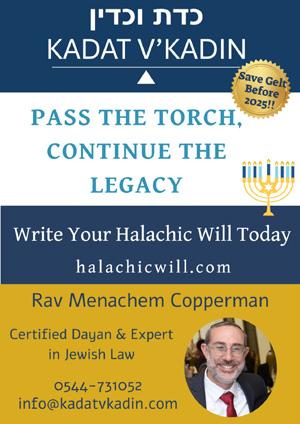






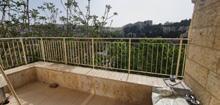


THOUGHTS ON THE WEEKLY PARSHA
Thoughts on the Weekly Parsha
RABBI LORD JONATHAN SACKS ZT"L
RABBI LORD JONATHAN SACKS ZT"L
FORMER CHIEF RABBI OF THE UNITED HEBREW CONGREGATIONS OF THE COMMONWEALTH
FORMER CHIEF RABBI OF THE UNITED HEBREW CONGREGATIONS OF THE COMMONWEALTH
May the learning of these Divrei Torah be תמשנ
HaRav Ya'akov Zvi ben David Arieh zt"l
It was Joseph’s first real attempt to take his fate into his own hands, and it failed. Or so it seemed.
Consider the story so far, as set out in last week’s parsha. Almost everything that happens in Joseph’s life falls into two categories. The first are the things done to him. His father loves him more than his other sons. He gives him a richly embroidered cloak. His brothers are envious and feel hatred towards him. His father sends him to see how the brothers are faring, attending the flocks far away. He fails to find them and has to rely on a stranger to point him in the right direction. The brothers plot to kill him, throw him in a pit, and then sell him as a slave. He is brought to Egypt. He is acquired as a slave by Potiphar. Potiphar’s wife finds him attractive, attempts to seduce him, and having failed, falsely accuses him of rape, as a result of which he is imprisoned.
This is extraordinary. Joseph is the centre of attention whenever he is, as it were, onstage, and yet he is, time and again, the done-to rather than the doer, an object of other people’s
actions rather than the subject of his own.
The second category is more remarkable still. Joseph does do things. He dreams. He runs Potiphar’s household superbly. He organises a prison. He interprets the steward’s and baker’s dreams. But, in a unique sequence of descriptions, the Torah explicitly attributes his actions and their success to God.
Here is Joseph in Potiphar’s house:
God was with Joseph, and He made him very successful. Soon he was working in his master’s own house. His master realised that God was with [Joseph], and that God granted success to everything he did. (Gen. 39:2-3)
As soon as [his master] had placed him in charge of his household and possessions, God blessed the Egyptian because of Joseph. God’s blessing was in all [the Egyptian] had, both in the house and the field. (Gen. 39:5)
When Joseph in prison, we read:
God was with Joseph, and He showed him kindness, making him find favour with the warden of the dungeon. Soon the warden had placed all the prisoners in the dungeon under Joseph’s charge. [Joseph] took care of everything that had to be done. The warden did not have to look after anything that was under [Joseph’s] care. God was with [Joseph], and God granted him success in everything he did. (Gen. 39:21-23)
And here is Joseph interpreting dreams:
‘Interpretations are God’s business,’ replied Joseph. ‘If you want to, tell me about [your dreams].’ (Gen. 40:8)
Of no other figure in Tanach is this said so clearly, consistently, and repeatedly. Joseph seems decisive, organised, and successful, and so he appeared to others. But, says the Torah, it was not him but God who was responsible both for what he did and for its success. Even when he resists the advances of Potiphar’s wife, he makes it explicit that it is God who makes what she wants morally impossible:
“How could I do such a great wrong? It would be a sin before God!” (Gen. 39:9)
The only act clearly attributed to him occurs at the very start of the story, when he brings a “bad report” about his brothers, the sons of Bilhah and Zilpah the handmaids. (Gen. 37:2) This apart, every twist and turn of his constantly changing fate is the result of someone else’s act, either that of another human or of God.1
That is why we sit up and take notice when, at the end of the previous Parsha, Joseph takes destiny into his own hands. Having told the chief steward that in three days he would be pardoned by Pharaoh and restored to his former position, and having no doubt at all that this would happen, he asks him to plead his cause with Pharaoh and secure his freedom:
“When things go well for you, just remember that I was with you. Do me this favour and say something about me to Pharaoh. Perhaps you will be able to get me out of this place.” (Gen. 40:14)
What happens? “The chief steward did not remember Joseph. He forgot about him.” (Gen. 40:23) The doubling of the verb is powerful. He did not remember. He forgot. The one time
1. As for Joseph’s dreams – were they a Divine intimation or a product of his own imagination? – that is another story for another time.


Jerusalem Real Estate is My Business Eta: 054-723-3863
Amazing stand alone homes in OLD KATAMON, TALBIYA, BAKA, GERMAN COLONY
In GERMAN COLONY. New exclusive. Rehov Harakevet. 110 sqm with 4 bedrooms, 2 full ensuite bathrooms. 116 sq, registered garden, parking. Completely accessible. 8,650,000 NIS
MUSRARA. Beautiful original Jerusalem home 185 sqm, completely renovated. Private entrance into magical garden. Sold with a renovated unit used for AirBnB. Parking spot option. 7,400,000 NIS
In GERMAN COLONY. 300 sqm plus 170 sqm reg garden. Plus parking & roof top terrace. 18.000,000 NIS
180 sqm Penthouse on an exclusive street in ARNONA. 40 sqm balcony, registered parking. Very high standard finish. 9,800,000 NIS
Theatron Hotel and Residences. TALBIYA 9 apartments left for sale





Eta Morris Realty, Ltd. etamorrisrealestate@gmail.com
Eta: 054-723-3863 etamorrisrealty.co.il
Joseph tries to be the author of his own story, he fails. The failure is decisive. Tradition added one final touch to the drama. It ended Parshat Vayeshev with those words, leaving us at the very point that his hopes are dashed. Will he rise to greatness? Will his dreams come true? The question “What happens next?” is intense, and we have to wait a week to find out.
Time passes and with the utmost improbability (Pharaoh too has dreams, and none of his magicians or wise men can interpret them – itself odd, since dream interpretation was a specialty of the ancient Egyptians), we learn the answer. “Two full years passed.” Those, the words with which our parsha begins, are the key phrase. What Joseph sought to happen, happened. He did leave the prison. He was set free. But not until two full years had passed. Between the attempt and the outcome, something intervened. That is the significance of the lapse of time. Joseph planned his release, and he was released, but not because he planned it. His own attempt ended in failure. The steward forgot all about him. But God did not forget about him. God, not Joseph, brought about the sequence of events – specifically Pharaoh’s dreams – that led to his release.
What we want to happen, happens, but not always when we expect, or in the way we expect, or merely because we wanted it to happen. God is the co-author of the script of our life, and sometimes – as here – He reminds us of this by making us wait and taking us by surprise.
That is the paradox of the human condition as understood by Judaism. On the one hand we are free. No religion has so emphatically insisted on human freedom and responsibility. Adam and Eve were free not to sin. Cain was free not to kill Abel. We make excuses for our failures – it wasn’t me; it was someone else’s
fault; I couldn’t help it. But these are just that: excuses. It isn’t so. We are free and we do bear responsibility.
Yet, as Hamlet said: “There’s a divinity that shapes our ends/ Rough-hew them how we will.” God is intimately involved in our life. Looking back in middle or old age, we can often discern, dimly through the mist of the past, that a story was taking shape, a destiny slowly emerging, guided in part by events beyond our control. We could not have foreseen that this accident, that illness, this failure, that seemingly chance encounter, years ago, would have led us in this direction. Yet now in retrospect it can seem as if we were a chess piece moved by an invisible hand that knew exactly where it wanted us to be.
It was this view, according to Josephus, that distinguished the Pharisees (the architects of what we call rabbinic Judaism) from the Sadducees and the Essenes. The Sadducees denied fate. They said God does not intervene in our lives. The Essenes attributed all to fate. They believed that everything we do has been predestined by God. The Pharisees believed in both fate and freewill. “It was God’s good pleasure that there should be a fusion [of Divine providence and human choice] and that the will of man with his virtue and vice should be admitted to the council-chamber of fate” (Antiquities, xviii, 1, 3).
Nowhere is this clearer than in the life of Joseph as told in Bereishit, and nowhere more so than in the sequence of events told at the end of last week’s Parsha and the beginning of this. Without Joseph’s acts – his interpretation of the steward’s dream and his plea for freedom – he would not have left prison. But without Divine intervention in the form of Pharaoh’s dreams, it would also not have happened.
This is the paradoxical interplay of fate and
freewill. As Rabbi Akiva said: “All is foreseen yet freedom of choice is given” (Avot 3:15). Isaac Bashevis Singer put it wittily: “We have to believe in freewill: we have no choice.” We and God are co-authors of the human story. Without our efforts we can achieve nothing. But without God’s help we can achieve nothing either. Judaism found a simple way of resolving the paradox. For the bad we do, we take responsibility. For the good we achieve, we thank God. Joseph is our mentor. When he is forced to act harshly, he weeps. But when he tells his brothers of his success, he attributes it to God. That is how we too should live.
These weekly teachings from Rabbi Sacks zt”l are part of his ‘Covenant & Conversation’ series on the weekly Torah teaching. With thanks to the Schimmel Family for their generous sponsorship, dedicated in loving memory of Harry (Chaim) Schimmel. Visit www.RabbiSacks.org for more.








ISRAEL’S LEADING REAL ESTATE NETWORK
Enjoy beautiful panoramic view of Jerusalem from your swimming pool! 5.5-room, 144 sqm garden apartment with a private 277 sqm garden & swimming pool, double underground parking, great potential for re-designing and renovating. Exclusive! Itsik 055-4318147

2-room apartment + large courtyard (exclusive use), private entrance, easy access by car, near public transportation, Mahane Yehuda market, Sacher Park, Gerard Becher visual arts campus. Expansion potential (+ future urban renewal). Immediate - keys with Anglo-Saxon. Exclusive! Ze'ev 053-5212207

NEAR BAYIT VEGAN & MT. HERZL
In a new tower by the light rail, 245 sqm, spaciously divided into 5-rooms, beautiful open terrace with deck & jacuzzi, magnificent panoramic views. High-end design, appliances & fixtures, private parking spaces, speed elevators (Shabbat), shops & services at base of building, near quality synagogues & schools, medical centers, playgrounds, green parks and nearby nature, easy access to all parts of city and to TLV, Exclusive! Dotan 053-5888824



3

BY RABBI NACHMAN (NEIL) WINKLER FACULTY, OU ISRAEL CENTER
The third and fourth p’rakim of Sefer Zecharya were instituted by our Tana’im to be the haftarah reading for Shabbat Chanukah [Mishna Megilla 33a]. While our Rabbis focused on the prophet’s vision of the Temple menorah as a reminder of the later Chanukah miracle of the oil, they also saw a lesson found in Hashem’s proclamation: “Lo v’chayil v’lo v’cho’ach, ki im b’ruchi…”, that true victory comes though G-d alone, and, therefore, the haftarah selection properly downplays the military victory of the Chashmona’im.
Interestingly, Rabbi Hayyim Angel points to the Pesikta Rabbati, a midrashic collection, that suggests two other sources, alternative haftarot for Shabbat Chanukah, that offer different understandings of the essence of the holiday.
In Pesikta Rabbati 4 we find that the dramatic narrative of Eliyahu HaNavi at Har HaCarmel
Love Ruby, Tammy, Morris, Uri, Shelli Grandchildren and Great grandchildren
[Sefer M’lachim A 18] was regarded as the proper reading for Chanukah, as the story of how Hashem sent fire from heaven to consume the Eliyahu’s korban and, by doing so, disproved the false belief of Ba’al. Clearly, this divine was to be understood as reflecting Hashem’s “intervention” in the time of the Chashmona’im by keeping the fire of the Temple menorah kindling throughout eight days. Additionally, Eliyahu’s subsequent destruction of the false “prophets” of Ba’al, would remind future generations how G-d effected the destruction of the idolatrous Hellenists through the Maccabees’ miraculous victory in battle, thereby removing the “falsehoods” over the idolatrous Greeks culture.
In Pesikta Rabbati 8, however, the authors suggested that the appropriate reading for Shabbat Chanukah is a selection taken from Tzephania 1 in which the navi says that, in the future, Hashem would purify Yerushalayim from sin, stating: …achahpeiss et Yerushalayim baneirot…”, “I will search Yerushalayim with candles…”, which, naturally, connects us to the neirot of Chanukah. The navi’s use of “candles” as the tool to search out sin, Rabbi Angel explains, leads the pesikta, to regard Chanukah in a more “spiritual” way, as a time of introspection and teshuva, when we should rededicate and purify our souls, just as the Maccabim rededicated and purified the Bet HaMikdash.
In summation, Rabbi Angel remarks:
“Although Jewish tradition adopted the reading of Zecharia (prakim 3-4) as the haftarah, it
is illuminating to consider the Rabbinic alternatives to how best to capture the essence of Chanukah. Those who preferred the Eliyahu narrative, applauded the religious zealotry of the Maccabees. Those who favored Tzephaniah (perek 1), believed that personal introspection and repentance-rather than the national eventshould be at the forefront of our Chanukah experience. In the end, Zecharya’s vision is the one that was adopted. The sages teach that we should serve G-d to fuel G-d’s presence among us. This spirit, rather than zealotry or the military victory, should dominate our religious experience of Chanukah.”
I always find Rabbi Angel’s essays enlightening and fascinating, and, as in this case, food for thought. I do wonder, however, whether the different choices of haftarot and, consequently, the varied approaches to the essential message of Chanuka itself, are shaped by the historical/ miraculous events of Chanukah or by the perception of each generation in various places. How, I wonder, did the Spanish Jewish Community of 1492 relate to the events of Chanuka and its message as opposed to how the citizens of Israel see the Chanuka message today? Is it the same or not?
I would submit, rather, that the approach of Chazal is best understood as regarding the celebration of Chanukah as a reminder and as an affirmation of Hashem’s constant protection and care. It might be seen through unexpected “natural” events or through unpredicted heroic deeds.
Either way, it is our obligation to realize that G-d watches over us always, that “Hineh lo yanum v’lo yishan Shomer Yisra’el”.

Rabbi Winkler’s popular Jewish History lectures can be viewed by visiting the OU Israel Video archive: https://www.ouisrael.org/video-l ibrary


Rabbi
Pharaoh sent for Yosef, and he was hurried out of the dungeon. He had his hair cut , changed his clothes, and then appeared before Pharaoh. (Bereshit 41:14).
After the Sar Hamashkim informs Pharaoh that there is a Jewish lad in prison that may be able to decipher his dream, Pharaoh sends messengers to retrieve Yosef. One would have thought that Yosef would be all excited to be freed from jail and rush to freedom. Yet, the phrase used is “he was hurried”
The messengers rushed Yosef, rather than Yosef himself rushing to freedom.
At the end of last week’s parsha, some mefarshim interpret Yosefs’s request that Sar Hamashkim not forget him when the butler appears before Pharaoh as exhibiting a lack of faith in Hashem and that is why he was destined to remain in prison for an additional two years. This may be hard for us to comprehend because one must do his hishtadlut and not rely on miracles (some explain that he asked twice – the verb רכז appears twice in the pasuk, See Bereshit 40:14, which is why he remained
in prison for two years).
Even if it may have appeared that there was a crack in Yosef’s bitachon, now after 13 years in prison, Yosef maintains his composure and does not get overly excited by Pharaoh’s messengers. If he is meant to be freed, it is the will of God and he does not have to fear the decree being reversed. Yosef does not miss a heartbeat. He is in total control of his emotions and actions. After changing his clothes, in an orderly manner he “goes” to Pharaoh אביו - and does not run to Pharaoh.
David Hamelech states:
Even when I walk in the valley of darkness, I will fear no evil for You are with me…. (Tehillim 23:4).
Even in the most difficult times, David Hameleh teaches us to have no fear, but rather faith in God. This is in contrast to Pharaoh, who when he awakes from his dream his spirit is agitated, knocking within him like a bell (see Rashi: 41:8 - וחור םעפתו).
Avraham is commanded to sacrifice his son. We are told that the next morning he rises early
. This does not only highlight that he acted quickly to fulfil God’s command- but that he was able to sleep the previous night! Imagine how one would feel knowing they would be sacrificing their child in the morning. Likely thoughts would keep one up all night. Avraham was calm, because of his steadfast faith and so he was able to sleep. Like Yosef, he remained cool and collected.
As we experience challenging times, we
have to maintain our composure. When sirens sound, it is essential to not panic but to react in a calm manner and to get to a safe location. It not only affects us, but also has an impact on others around us. By strengthening our faith and belief that Hashem is watching over us, will facilitate calming us so that we act rationally in all scenarios.
Yosef’s deep Emunah and Bitachon enabled him to maintain his spiritual equilibrium along with his cool, calm and collected attitude. May we be able to exhibit this attitude as well.



• 3 room apartment
• Quiet, near a park
• 3 full exposures
• Great location
• Elevator
• Sukkah balcony
• MM"D
• Storage room
• Private Parking
• 2 full bathrooms
• Under floor heating and A/C


ENGLISH SPEAKING LAW FIRM
Orit Madar, Adv. Family Law and Mediation Divorce, Child support, Custody Inheritance & Wills
Yariv Madar, Adv. Bodily Injuries, Medical Malpractice Civil Litigation




Dr. Barry Dinner MBBCH, ABAARM is a highly experienced physician, certified by the American Academy of Anti-Aging Medicine, who offers a unique approach to anyone looking to prevent and manage Alzheimer’s disease, memory loss or cognitive decline. OTHER SPECIALTIES

10 Hillel St , Jerusalem | 36 Dam hamkabim st , Modiin 02-6255592, 050-3202909 Madar@netvision net il

Throughout the Jewish calendar year we find special moments that are considered an “et ratzon,” times of particular favor when our tefilot retain extra potency and ascend to higher realms with greater ease. Lighting the Chanukah candles is one such time, the heavens are open for tefilot and requests for both spiritual and physical desires. It is customary then, to recite select chapters of Tehillim following the lighting. Chasidic sources have noted that the last verse of Chapter 90 and chapter 91has unique significance [some say this 7 times] as well as chapters 30, 33, 67, 91, 133 and the text “Ana B’koach.” Let us focus here on the end of chapter 90 and chapter 91 to gain a deeper understanding of this time and the power it holds.
We are told that Moshe Rabbeinu wrote these two chapters when the Mishkan was completed and erected in the desert on the 25th of Kislev. Although the actual Chanukat haMishkan, the inauguration ceremony of the Mishkan, took place on a later date, Hashem repaid the 25th of Kislev thousands of years later with the Chanukat haBayit in the time of the Chashmonaim. When we say this chapter, we recall the distinctiveness of this day both in the times of the Jews’ sojourn in the desert as well as in the times of the Chanukah miracle. In Netivot Shalom the Slonimer Rebbe notes
that these verses express the overarching perspective and belief of the Maccabim. Saying these words fortified their emunah as they recognized that having Hashem’s help was the only way they would succeed. Indeed, the Tashbetz teaches that we repeat the last verse in chapter 91 so we can say 130 words (with the colel, including the word itself), the numerical value of hakohanim. This signifies that the very essence of the Maccabim was their understanding that the great power of bitachon brings salvation from a supernatural domain. The theme of the chapter articulates complete dependency on Hashem; He is the only stronghold and protection. Further the Netivot Shalom points out, bitachon in Hashem is the major motif of Chanukah, the only way we as Jews can withstand and survive the struggles and challenges of galut.
Rav Kaufman zt”l in Mishchat Shemen suggests another rendition of the name Macabi that has been found in old manuscripts. Maccabi is generally understood as the acronym, “Mi Kamocha B’elim Hashem” conveying Hashem’s might and strength in battle. However, Maccabi can also be spelled with a kuf instead of a kaf making it an acronym for the phrase, “Mei’olam Kivinu Becha Hashem – We will always hope to you, Hashem.” This rendering downplays the physical prowess and underscores our total reliance on Hashem. We say this chapter in the nightly Shema as well, reminding ourselves that it is only by placing our hope and faith in Hashem that we can merit salvation.




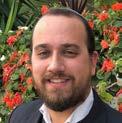
PAGE BY RABBI EZRA FRIEDMAN Director, The Gustave & Carol Jacobs Center for Kashrut Education Director, The Gustave & Carol Jacobs Center for Kashrut Education
The prohibition
In Eretz Yisrael we have the unique mitzvot hateluot ba’aretz, the mitzvot connected to the land of Israel. This includes teruma, maaser and orlah. Although these mitzvot are not normally performed or supervised by consumers in Israel, kosher certifications make sure that these mitzvot are adhered to. This article will focus on a unique connection between teruma and the holiday of Chanukah.
According to Biblical law, food that is completely kosher and cooked by a nonJew is permitted. However, our Sages decreed that such food, even when cooked in kosher utensils, is prohibited for consumption. This prohibition is known as bishul akum. In the coming weeks we will discuss the parameters of this rabbinic prohibition, including the reasons behind the decree, when it applies, and the practical halacha for modern industrial kashrut.
The mitzvot of teruma and maaser relate to any produce grown in the land of Israel. This includes grains, citrus fruit, grapes and vegetables. Teruma and maaser are tithes given in different fashions and to different people. Some tithes are given to a kohen such as teruma gedolah. In the time of the Beit Hamikdash the kohanim would consume any teruma given to them. One of the questions most relevant is what is done with the teruma and maaser in modern-day Israel?
Food is a very connecting element in every society. That is the basis behind the decree of bishul akum. Our Sages were very concerned about close relationships with non-Jews since intermarriage is a very severe transgression. The prohibition effectively limits Jews and gentiles dining with
Rabbeinu Shimshon from Sens (Chalah 4:8) and others all rule that teruma is not given to the kohen in our days. The reason for this is because a kohen must eat teruma in a pure status. If a Jew becomes impure through contact with a dead body or someone who has been in contact with a dead body they require a purification process. An elemental part of the purification process requires ash from a red heifer (parah aduma). Since this hasn’t been found in thousands of years and we don’t have a Beit Hamikdash to perform the purification process all Jews are considered impure by default. As such, kohanim cannot consume teruma under any circumstances.
maintain that the decree is based on this issue of closeness to non-Jews that could lead to intermarriage; this is the opinion of most early authorities. However, Rashi and others attribute a different reasoning to the prohibition of bishul akum, which is that non-Jews might mix non-kosher ingredients into the kosher food. In future articles we will discuss whether the parameters of bishul akum are based on both of these reasons or just one. However, it is clear from numerous sources that the danger of intermarriage is the main reason behind the prohibition (See Torat Habayit 3:7).
The decree is binding regardless of the reason

Based on this reality every time teruma is separated it is disposed of in an appropriate fashion. This custom happens all over Israel in different settings. For example, large supermarket changes have storage facilities where all fruits and vegetables are stored before being shipped to the branches. There are mashgichim (kosher supervisors) in charge of separating and disposing of hundreds of tons of produce a year in order to fulfill these mitzvot and permit them for consumption for the Israeli public. Israeli wineries pour out thousands of liters of wine in order to permit them for consumption.
There is one very unique exception to this rule. Teruma olive oil for lighting candles may be used by kohanim. Although an impure kohen cannot consume olive oil that is teruma, he can use it to light candles. The difference between the regular produce and olive oil is that since olive oil can be used for burning and the impurity of the kohen does not affect
Since the transgression of intermarriage was the primary concern behind our Sages’ decree, their goal was to powerfully discourage the possibility of developing emotional connections to non-Jews that could lead to intermarriage either in that generation or the next. Accordingly, early authorities discuss whether the prohibition of bishul akum still applies even in situations where intermarriage is not technically possible. For example, Rashba, in his responsa (1:248), examines the case of food cooked by a priest. Being that Catholic priests do not marry nor do they have children with whom to intermarry, is it permitted to eat food cooked by a priest even though the reason for bishul akum seemingly does not apply to
the oil when burnt it is permitted for that use. This benefit for kohanim is the closest we can come to the times of the Beit Hamikdash where kohanim would actually consume the teruma they were given.
Rav Yitzchak Yaakov Weiss in his responsa (Minchat Yitzchak 9:119) discusses at length whether a kohen can use teruma olive oil to light chanukah candles. He rules that it is certainly permitted and in fact the custom in Yerushlayim for many generations was to give teruma olive oil to kohanim to light Chanukah candles.
The OU Israel Gustave & Carol Jacobs Center for Kashrut Education was created to raise awareness and educate the public in all areas of kashrut. Rabbi Ezra Friedman, Deputy Rabbinic Administrator for OU Kosher Israel is the Center's director. him? Rashba answers that we have a rule regarding rabbinic decrees: even when the reason does not apply, the prohibition still stands. This is a necessary element in every rabbinic prohibition. Otherwise, Rashba explains, people could rationalize and find reasons why any decree should not apply in their particular situation. Accordingly, Rashba concludes that even food cooked by a Catholic priest has the prohibition of bishul akum. A similar ruling is made by Ramban (Avodah Zara
It should also be noted that the same applies

teruma from olive oil and use it to light Shabbat candles as well.
gentiles, even if the ingredients and utensils are kosher.
The reason cited by most authorities is the risk of intermarriage.
• Teruma is given to kohanim from any produce grown in Eretz Yisrael.
• Since there is a concern that all kohanim are impure the teruma tithe is disposed in an appropriate fashion.
• One may give teruma olive oil to a kohen to use for Shabbat and Chanukah candles.
Even in cases with virtually no risk of intermarriage, the food is still prohibited, including non-Jewish royalty, priests, young children, and non-Jews from distant lands.







• Curtains & draperies
• Designer curtains
• Venetian & Woven wood blinds
• Blackout, Vertical, Roller, Roman & Pleated shades


www.ashleywilde.co.il



The largest collection of exclusive Jerusalem properties is just one search away www.remaxjerusalem.com

Harav Berlin St, Kiryat Shmuel
Amazing Penthouse - near Rehavia, panoramic views to Knesset/ Israel Museum! 4 rms with 2 huge balconies+ Bldg rights NIS 5,500,000

Alyssa 054-668-4111 Gila 052-603-5350
Ariyel Maresky 054-577-7509

Rehavia
prime location, Abarbanel, ground floor, charming registered 70 sqm garden apt with attached 30 sqm studio apt. NIS 5,890,000

Orna Even Parker 054-621-6069


Elisha St, Musrara


Olei HaGardom St, Armon Hanatziv
Prime investment! Spacious 3-bedroom, 95 sqm apartment in Jerusalem. Excellent location, perfect for young families! NIS 2,350,000

Micha Paul 052-511-6340

Elkachi St, Armon Hanetziv

Stunning 200 sqm, renovated, private home, 5 Ensuite Bedrooms high-end finishes, beautiful authentic salon, 50 sqm private garden. Orna 054-6216069 Yisraela 052-577-4853

Beautifully renovated 3-bedroom garden apartment, with ensuite bathroom, a large sukkah balcony, and an expansive, lush private garden.NIS 4,190,000 Micha Paul 052-511-6340

Isser Nathanson St, Pisgat Ze'ev

132 sqm, Duplex, 6 rooms, 3 bathrooms, 2 balconies of 45 sqm, 80 sqm Garden, 2 parking spots, Additional unit, Beautiful views. NIS 3,700,000 David Weiser 055-276-2960




Metzltime St, Ma'ale Adumim Stunning house for sale, 260 sqm corner house 8 rooms 4 bathrooms, unbelievable view, big garden Perfect location Israela Cohen Krakauer 052-577-4853


Mendaleh St 4. Talbiya 4 room, 2nd fl. Elevator, 107 sqm + balcony + storage Lease until 2050 – Garry Barnet, enormous potential NIS 3,750,000 Alon Ben-David +972 50-882-2050

Moshe Ben Tov St, Ramat Shlomo
Great location walking distance from the light rail 87 sqm 3.5 rooms +balcony, Safe room, Underground Parking NIS 2,900,000

David Weiser 055-276-2960

Executive Director, Camp HASC
Author of Baderech: Along the Path of Teshuva (Mosaica 2021)
Mischel EXECUTIVE DIRECTOR, CAMP HASC AUTHOR OF BADERECH: ALONG THE PATH OF TESHUVA (MOSAICA 2021)
There are few among Chasidic masters — and indeed among all Jewish personalities throughout the course of history — as beloved as ‘Reb Zusia’ or Zusha (the Sweet One) of Anipoli. With non-assuming righteousness, almost child-like sincerity and profound self-effacement, Reb Zusha embodied real, natural, down-to-earth holiness. The Kotzker Rebbe referred to Reb Zusha as “a genius in humility”. Among the students of the Maggid, Reb Zusha was deeply respected even while sometimes considered humble to a fault. In his unselfconscious innocence he would never refer to himself as ich, “I”, rather he would say, “Zusha doesn’t understand,” or “Zusha is hungry,” etc.
One year, before hadlakas neiros on the first night of Chanukah, Reb Zusha began to cry… “Oy!” he exclaimed under his breath, “Kodesh heim, kodesh heim! These lights are holy! How could it be that someone as lowly as Zusha has the gaul to approach the menorah and kindle a flame? Oy, Zusha you have some nerve, such chutzpah! How dare you light the holy Chanukah candles?” Sinking into his chair and placing his face in his hands, he seemed to fall into a faint.
After many minutes, Reb Zusha lifted his head with a relieved smile, wiped his tears, and proclaimed aloud, “Ah, yes! The Gemara (Taanis, 25a) speaks of the daughter of Rebbe Chaninah ben Dosa who mistakenly lit vinegar
instead of oil on one Erev Shabbos… A nes gadol, a great miracle occurred, and the vinegar burned as oil! But she was still so worried; her face fell, and she exclaimed, ‘How could I have done such a thing? And who am I? What if this miracle has used up all of my zechuyos, merits?’ Then her father, the wise Tanna Rebbe Chaninah, smiled at her with compassion and gave her chizuk. ‘My sweet, precious one! Don’t you see? When oil ignites and illuminates, it is just as miraculous as when vinegar ignites and lights up the room! And קולדיו
, ‘The One Who instructed the oil to light can tell vinegar to light!’”
Reb Zusha then cried out, “Yes! The same Ribbono shel Olam who allows oil to ignite is the same God who made the vinegar of Rebbe Chaninah’s daughter ignite — and He is the very same God now telling me, the sour, bitter, unworthy Zusha to light these holy candles!”
The tzadik Reb Zusha stood up, and with awe and joy, sang the berachos, lit the first Chanukah candle, flooding his home, the street and the whole world, with light.
Chanukah marks the celebration of our persistence in face of enemies from within and without who sought to undermine our identity, our sense of self and our belief in the segulah, the unique preciousness, of Klal Yisrael. Painfully, many rejected their faith in Hashem and their holy Jewish pride; the gezeiros of the Yevanim had struck at the core of our souls, our spirituality and our confidence in being God’s Chosen People. The Greeks had even commanded Klal Yisrael: “Write on the horn
of a bull, לארשי
, that you have no cheilek, no ‘part’ in the G-d of Israel” (Medrash Rabbah, Bereishis, 2:4). ‘Who do you think you are?’
A unique aspect of hilchos Chanukah provides instructive insight: “One who sees a burning Chanukah candle (even while walking on the street) must recite the blessing (Shabbos, 23a). Seeing these holy lights is clearly unlike seeing matzos on Pesach, or seeing someone taking the arba minim on Sukos. As the commentaries point out, the reason is because הביבח
דאמ דע איה, “The mitzvah of Chanukah candles is exceedingly precious!” (Tosfos, Sukkah 46a; Rambam, Hilchos Megillah v’Chanukah, 4:12)
An insight of Rav Joseph Soloveitchik fills out this picture:
“HaNeiros halalu Kodesh heim”, these candles, they are Holiness… The Gemara (Shabbos, 22b) instructs us: ‘Throughout our sojourn in wilderness, the light of the Menorah, the ner tamid, the unending light, emanated from the Mishkan as לארשיב הרוש הניכשהש םלוע יאבל איה תודע testi- , mony to all of the world that the Shechinah, the Divine Presence, rests upon Israel.’ Thus, lighting the Chanukah menorah is a demonstration that the light of the Shechinah, the light of Kodesh, rests upon Am Yisrael eternally and always, wherever we may be: Kodesh heim, ‘They, the Jewish People, are themselves Holiness.’
In Yiddishkeit, the lights we kindle in our Divine service are meant to be understood as manifestations of our soul: םדא תמשנ ׳ה רנ, “The lamp of Hashem is the soul of man” (Mishlei, 20:27). Furthermore, the letters of שפנ, nefesh, soul, is a roshei teivos, an acronym of ner (the kli, vessel), petil (the wick), shemen (the oil). This is who we are; lamps of the Holy One!
Beyond recreating the experience of the victory of light over darkness in the Maccabean





revolt, kindling our Chanukah candles demonstrates faith in ourselves, that יקולאב
לארשי, “We do have a cheilek in the God of Yisrael.” In our homes and in the public domain, the pirsumei nisa, the public display of our Chanukah light cultivates confidence in our soul, empowering us and our people to believe in the light that we generate in our Divine service. Each one of us is ‘exceedingly precious’; our souls are a cheilek Elokah mi-ma’al mamash, literally ‘part’ of the God of Yisrael above. And when we just light one small candle in the darkness, it is ‘exceedingly precious’ and sweet in Hashem’s eyes.
May our hadlakas neiros this year sweeten all our bitterness, bring the victory in our inner and outer struggles, vanquish all darkness, wipe away the tears, and illuminate the whole world with the holiness of the Shechinah — the ner tamid of the collective soul of Am Yisrael.

BY RABBI SAM SHOR
Program Director, OU Israel Center
BY RABBI SAM SHOR DIRECTOR, TORAH INITIATIVES, OU ISRAEL
We are all familiar with the formula proscribed by halacha as to how we are to kindle the Chanukah lights, by lighting one candle on the first night of Chanukah, and adding one candle for each subsequent night, in accordance with the opinion of Beit Hillel, that one must always seek to increase and ascend in holiness, rather than decrease- maalin b’kodesh v’ein moridin.
Most of us associate this principle, and the entire mitzvah to kindle Chanukah lights, with the Talmudic account of the nes pach hashemen - the miracle of the small jar of oil that the Chashmonaim found hidden away, which burned for eight days instead of one.
It is interesting to note that there is an alternative version of the story of Chanukah which appears in the early rabbinic/midrashic collection known as the Pesikta Rabbati. In this account, upon entering the Beit Hamikdash, which was defiled by the Greeks, the Chashmonaim find not a small jar of oil, rather shmoneh shipudei barzel - eight iron spears, which they bound together as a makeshift
menorah and lit eight lights within this makeshift menorah.
In this version of the story, the Chashmonaim find the Beit HaMikdash in a complete state of impurity, and even the menorah was either destroyed or rendered impure and unusable. In that challenging moment, rather than despair, they found those eight iron spears, weapons that had been used for destruction and harm, the spoils of war, and bound them together to restore light and holiness within the walls of the Beit HaMikdash and the entire world.
Perhaps this depiction of what transpired when the Chashmonaim re-entered the Beit HaMikdash is an even stronger illustration of the halachic principle of maalin bkodesh v’ein moridin - taking those weapons, those vessels intended to cause harm, and elevating those very vessels into something sacred, to become the conduit to restore the lights of holiness both within the Beit HaMikdash,and subsequently the light that lives on through each of our chanukiot as well
Ultimately the yom tov of Chanukah is meant to inspire each of us to look at the world


is blessed by G-d: he lives in Beer L’chai Roi. The transition from Avraham to Yitzchak is complete. While G-d has been a silent partner in this parsha, here He completes the generational transfer – He blesses Yitzchak. The Jewish people will be Yitzchak and not Yishmael.
through the proverbial lens of maalin bkodesh vein moridin - to .emulate the Chashmonaim and seek opportunities to transform that which might be mundane or even profane, and elevate those very items and circumstances and make them sacred. The great Chasidic master, the Sabba Kadisha of Slonim zy’a, taught that when we demonstrate the desire to grow, to improve, to take even the smallest step forward, it serves as the catalyst for an increase in illumination from above.
7th Aliya (25:12-18) The generations of Yishmael are enumerated. Yishmael dies. His descendants dwell from Egypt to Assyria. Yishmael’s story is brief. He has numerous and powerful offspring. The brevity
Indeed Rabbi Moshe Wolfson,zy’a, in his beautiful sefer, Emunat Itecha, teaches that the very word Chanukah, is an acronym- Chet(8) Kohain, as we kindle our candles throughout the eight days of Chanukah each of us is a proverbial Kohain, each of has the ability to lift up the entire world through the sacred lights of our chanukiot.
echoes the theme in our parsha which mentions both the death of Sarah and Avraham.
King David was an older man and a woman was assigned to him to serve him and provide warmth.
Adoniyahu, one of King David’s sons, began to prepare for ascension to his father’s throne. This was despite the fact that King David expressed his wishes that his son Shlomo succeed him.
Adoniyahu convinces two very significant personalities - the High Priest and the commander of King David’s armies - to
BY RABBI CHANOCH YERES
Beit
When Avraham addresses the people of Cheit, trying to acquire a burial spot for his wife, he says “Ger V’Toshav Anochi Eimachem” (23:4) “A Stranger and a Resident am I with you”
This seems to be a contradiction. If one is a stranger than he is not a resident, if he is a resident than he is no longer a stranger. What did Avraham mean?
The Magid of Dubno (Jacob ben Wolf Kranz 1741-1804) explains that Avraham watched how he spoke in this tense situation in order to, both, state his truth and be able to keep the peace -Shalom Bayit. Avraham said, on the one hand, “I am a Resident’ due to G-d’s promise to receive this Land and on the other hand, I still need your agreement to purchase a plot. In other words, Avraham implied “I am the resident” and you are the “strangers”, while they understood him as saying that “they” are the residents and Avraham is the stranger.
May our Nerot Chanukah, inspire each of us to see the great opportunities that exist each and every day to experience growth and transformation, to sanctify the mundane and profane, maalin bkodesh v’ein moridin....Chanukah Sameach.
The peace was kept, and Avraham remained true to his ideals.
Shabbat Shalom


We are a young senior couple looking for a 1 bedroom furnished apartment in Jerusalem from December 2021-June 2022
JERUSALEM AND THE SURROUNDING AREAS | BEIT SHEMESH | TEL AVIV / CENTER | ESTATES IN MOSHAVIM | NEW CONSTRUCTION PROJECTS ALL OVER ISRAEL










SHIUR SPONSORS
TO SPONSOR A SHIUR CONTACT
Chana Spivack - 050-229-4951 or donate online: https://www.ouisrael.org/donate/ou-israel-center/
ALL SHIRIUM AT NITZANIM - TUE., DEC. 24TH
Sponsored by Rivki & Sammy Mark in memory of Rivki’s dear father who passed away on the third day of Chanukah - Selig Eisenberg z”l, Chaim Asher Zelig ben Yehudah HaCohen z”l
RABBI BRIETOWITZ’S SHIUR - TUE., DEC. 24TH
Sponsored by Vera Schwarcz in loving memory of her husband
Dr. Jason Wolfe z”l, Yosef Shimon ben Avraham Isaac & Rivka z”l on his 10th yahrzeit
RABBI ADLER’S SHIUR
Sponsored for this academic year by the Frist family in memory of their beloved daughter and sister Elisheva Frist a”h
RABBI SHAI FINKELSTEIN’S SHIUR
Sponsored for the 2024-2025 academic year by the Sondhelm and Wertenteil Families in memory of Mel & Sylvia David z”l










An incredible Shabbat experience celebrating the Legacy
Medical Ethics Philosophy Halacha Torah Scholarship
Special English Language Track with OU Israel

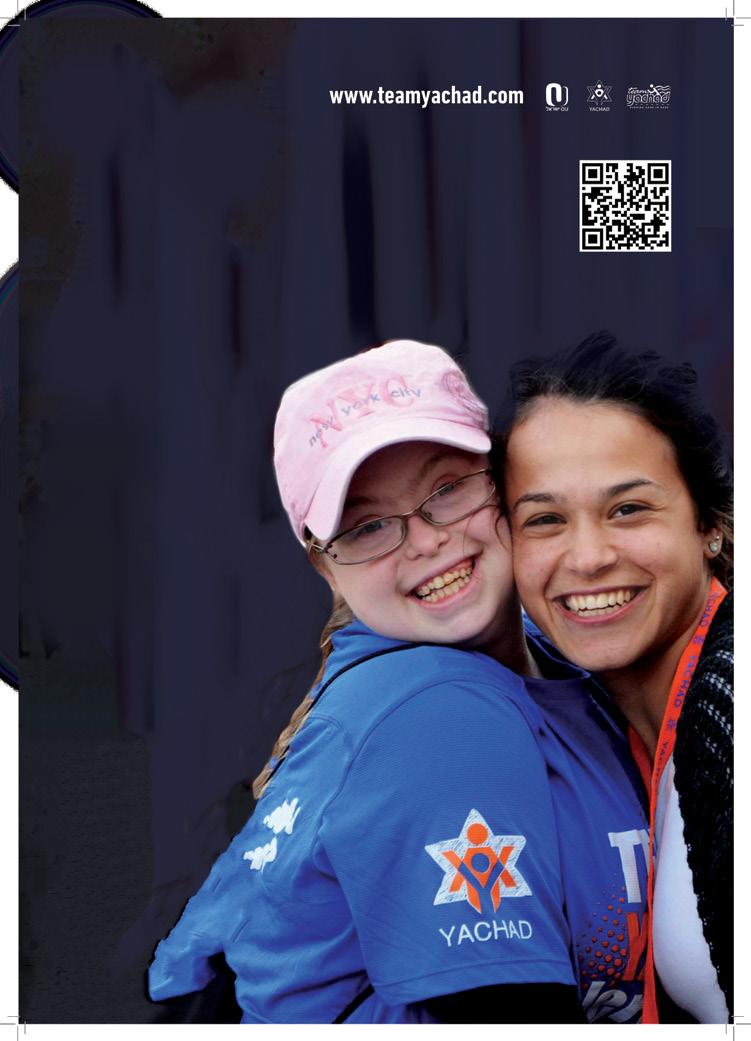
“Turning Despair into Hope”
www.yeshezra.org
Director: Menachem Persoff


THIS WEEK: Chanukah is here! Please bring light into the homes of the needy.
Website: www.yeshezra.org
Bank Transfer: Mercantile (17), Branch 642, A/C 79747843
Send Asmachta for receipt
Checks: “Yesh Ezra,” POB 31476, Romema, Jerusalem
Credit Card:
Sara – 077-820-0196 / 058-530-9161
Sun-Wed (10:00am-14.30 pm)
Tax benefit for donations as per section 46a of the Israeli tax code

**FOR RENT! Rechavia. Semi-detached renovated house, private entrance. 4 beds, 3 baths, fully equipped kitchen. 120 sqm garden.
$7,000 per month.
**FOR RENT! Rechavia 400 sqm house. Unique high standard fully furnished 9 bedrooms, 7 bathrooms + a private rooftop with a pool. Interior elevator + parking + storage.
$20,000 per month.
**FOR RENT! German Colony, exquisite apartment in a new building.
127 sqm, 3 bedrooms + 2.5 bathrooms with a sukkah balcony. State-of-the-art kitchen fully equipped, new appliances. Built-in closet in all rooms. Private parking + storage.
13 000 NIS per month

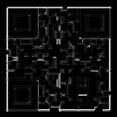
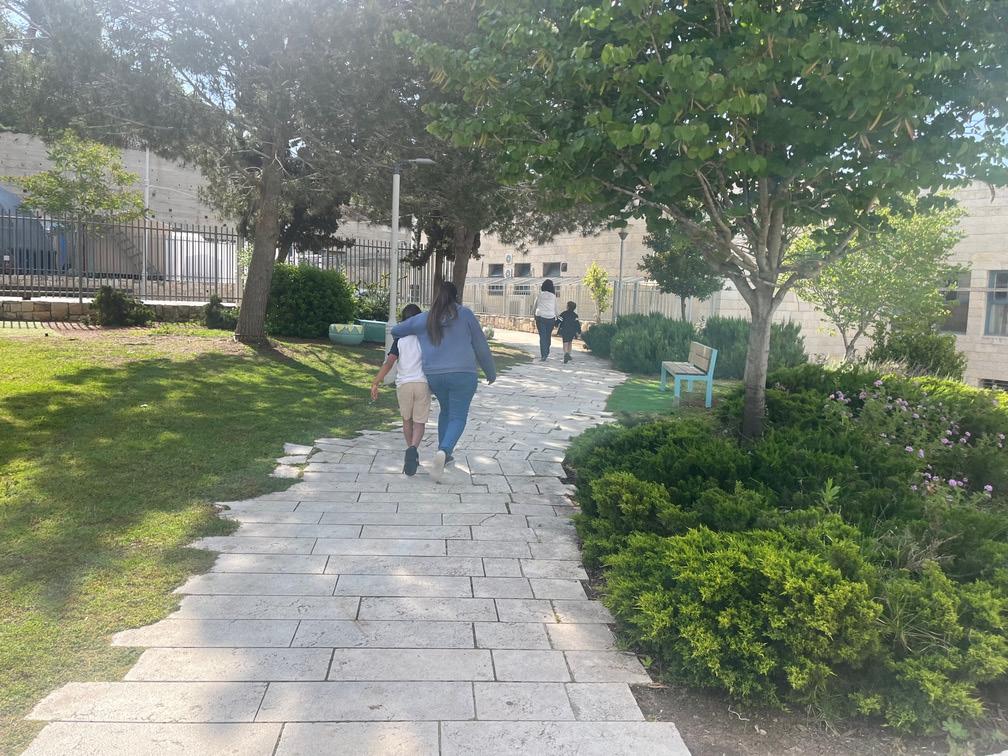



RABBI
MOSHE TARAGIN
RAM YESHIVAT HAR ETZION
MAGGID SHIUR ALL PARSHA AND ALL DAF, OU.ORG
The mitzvah of ner Chanukah commemorates the miracle of the oil, which symbolizes the triumph of Jewish resilience and faith over the mighty Greek armies of the Seleucid Empire.
After Alexander the Great’s death in 323 BCE, the vast Greek empire fractured into rival factions, with the Seleucids located to the north of Israel imposing their dominance over the Levant. Setting their sights on Jerusalem, they waged not only a military campaign but also a cultural and spiritual assault against our people, enacting harsh decrees designed to extinguish Jewish religious life.
Our victory was nothing short of miraculous. Against all odds, a small band of devoted warriors overpowered the mighty Seleucid forces. Their triumph marked not only a military success but a spiritual revival, as they reclaimed the Beit Hamikdash, purified it, and rededicated the sacred korbanot.
The victory of the Chashmonaim over the mighty Greek empire was not merely a military
success but a moral triumph. After their defeat, the once-dominant Greek empire entered a swift and irreversible decline. The miracle of the oil symbolized that our defeat of Greece was not just a moment of Jewish resilience but a decisive turning point in humanity’s spiritual history. Soon after these events, the Greek Empire began to crumble, finally disappearing in about 100 years after the Chanukah miracles. The miracle of the oil is a poignant reminder of the fragility of earthly power when set against the eternal endurance of a people devoted to Hashem and His Torah.
Yet, when the Rambam describes Chanukah, he places striking emphasis on the military victory and the subsequent restoration of Jewish sovereignty, rather than highlighting the miracle of the oil. Stressing the reclamation of Jewish self-governance he writes:
Evidently, the temporary restoration of Jewish sovereignty in the aftermath of the Chanukah miracle was itself -regardless of broader moral or international implications- a monumental moment in Jewish history, which justifies the recitation of Hallel for 8 days.
As the Rambam only references the miracle of the oil secondarily, it seems that he views our national triumph as the primary cause for
celebration and gratitude. The Rambam’s comments compel us to reflect more profoundly on the military victories that led to the restoration of Jewish sovereignty, and the significance of reclaiming Jewish national independence.
The period of Jewish sovereignty that followed the miraculous events of Chanukah was far from a pristine or flawless reign. While the Maccabees achieved several decisive military victories, culminating in their key triumph in 164 BCE, their struggle for sovereignty did not end with the miraculous rededication of the Mikdash.
The battles with the Greeks raged on, and tragically, just four years after the Chanukah miracle, in 160 BCE, Yehuda HaMaccabi, the heroic leader who had been instrumental in the victories, was killed in battle. Although the Maccabees secured significant victories and regained control of the Mikdash, their triumph was far from complete.
Additionally, the restoration of Jewish sovereignty, while monumental, was a fleeting achievement. The Jewish people enjoyed full sovereignty for only about 100 years before the situation dramatically changed. By 60 BCE, the Jewish monarchy had already become a client state under the Roman Empire, effectively losing its independence. The Rambam’s description of 200 years of Jewish sovereignty is somewhat misleading. While we enjoyed complete self-governance for the first 100 years, the remaining years were marked by diminished autonomy. In the latter half of this period, external forces, particularly Roman influence, began to erode our full independence, and Jewish sovereignty became increasingly compromised.
Moreover, this period of political restoration was marred by internal strife and
fragmentation. As soon as the Maccabees consolidated their power, the Tzedukim or Sadducee movement began to gain influence. They rejected Torah Sheba’al Peh and formed a separate faction, generally composed of aristocrats and individuals with political influence. The Tzedukim, or Sadducees, often infiltrated the office of the Kohen Gadol, manipulating this sacred position for political gain and power. Their ascent fueled social discord and internal strife, which would ultimately lead to the downfall of the Second Mikdash.
Sadly, much of the civil strife and unrest during this period stemmed from the descendants of the Chanukah heroes themselves. Yochanan Hyrcanus, the son of Shimon HaMaccabi, assumed the throne about thirty years after the Chanukah miracle. Under his leadership, Israel experienced significant territorial expansion, and Jewish sovereignty seemed to be on a strong footing. However, late in his life, he made a dramatic and troubling shift: he defected and joined the ranks of the Tzedukim.
The gemara in Berachot cites his example as a cautionary tale, warning against complacency in religious achievement. Hyrcanus’ turn away from the Masorah was especially poignant, given that even a righteous figure, who had remained steadfast for 80 years, had faltered toward the end of his life.
The defection of John Hyrcanus stoked tensions between the Tzedukim and the Perushim, leading to a deepening rift within Jewish society which would later erupt into outright civil war during the reign of his successor and son, Yannai HaMelech or Alexander Janneus.
Firmly aligned with the Tzedukim, he adopted an authoritarian rule that incited deep anger and opposition from the ranks
of the Perushim. His reign was marked by intense internal conflict, leading to a series of civil wars that lasted nearly six years and which took the lives of tens of thousands. One of the most infamous incidents occurred during a royal feast, when approximately 800 Jews were brutally murdered—likely crucified.
The ongoing internal conflict greatly weakened the Jewish state, setting the stage for the eventual Roman conquest of Yerushalayim in 70 CE. Tragically, during the Roman siege of Yerushalayim, rival factions, consumed by hatred and distrust, burned each other’s grain silos, further exacerbating the dire situation. This self-inflicted devastation hastened the fall of Yerushalayim, with the Romans finding the city already in a state of ruin. By the time the Romans breached the city’s walls, they found scenes of death and despair, and a city of corpses and half-starved skeletons.
After the Roman destruction of the Temple in 70 CE, followed by the brutal subjugation of the Bar Kochba rebellion in 135 CE, the victories of Chanukah faded into dust. The Maccabean and Chashmonaim triumphs, in the grand scope of history, were but a shortlived blip. The Chanukah miracle, though deeply significant in Jewish religious and cultural memory, became a distant symbol of a bygone era of independence.
All this raises a profound question: If the sovereignty that followed the Chanukah miracle was partial, if the Jewish nation was in such a weakened state, and if the leadership was so deeply flawed, what is it that we celebrate on Chanukah? The answer to this question, cannot be solely the miracle of the oil, since the Rambam only mentions this miracle second-hand, after emphasizing the military victory and the restoration of Jewish sovereignty.
Evidently, whenever Jewish sovereignty is achieved, we celebrate, regardless of its imperfections or the quality of its leadership. How elusive has Jewish sovereignty been throughout history? How hard have we fought to attain Jewish self-government? How much did our ancestors dream of the sights we live among every day? What would they give to live in a Jewish sovereign state, protected by a Jewish army?
It is precisely the imperfect nature of the sovereignty restored during Chanukah that makes it so contemporary. Our current state in Israel is not the ideal sovereignty we dream of. The state is still secular, and we have not yet reached the messianic milestones such as the arrival of Mashiach or the rebuilding of the Mikdash. Our society remains secular and deeply divided, and the moral standards of society sometimes leave much to be desired.
Yet, we do not nitpick this achievement, even if it falls short of many of the long-term spiritual dreams we harbor for our redemption. Take away the ideology and focus simply on sovereignty. Look aside from whatever Messianic expectations haven’t yet materialized and appreciate living in a Jewish state.
Especially this year, after enduring countless struggles to defend our Land, every Jew, from every corner of our people, should be bound together, but by the profound privilege of living in a Jewish state, a gift our ancestors could only dream of.

Rabbi Taragin’s newest sefer entitled “Reclaiming Redemption Deciphering the Maze of Jewish History (Mosaica)” is now available at: www.reclaimingredemption.com and in bookstores.

TRANSFER YOUR OLD FILM/VIDEO's (All formats) In Quality to Digital Preserve Family History from Fading Michael 052.286.8626

Photography with feeling Facebook.com/L'Dorot Photography
A small Sefer Torah with its own Aron Kodesh is available to shiva houses or for any other necessary occasion on a temporary free-loan basis. If needed call Uri Hirsch 0545513173
Walking down King George St. in Jerusalem and want a cold bottle of water?
Come help yourself to a bottle at 52 King George.
In loving memory of Yoni’s wife Tziporah a"h, a true Eishes Chayil, always full of chessed, kindness and laughter, and brought life and strength to so many people, that she touched! She was like Aron, who loved peace and pursued peace.

Yoni thanks Hashem for having the opportunity of having Tziporah in his life, to learn of her caring, patience and happiness, to overcome her challenges. May Tziporah's Neshama be a light onto the world, in a time of darkness, and may her Neshama shine to Gan Eden. Yoni misses Tziporah with tears in his eyes, as Hashem gave him a gift, a crown jewel, now he returns her to Hashem. With thanks and Toda. Love, Yoni
To help refill the supplysend tax deductible donations for Be’er Tziporah a"h Bottled Water Gemach to Chabad of RechaviaRabbi Yisroel Goldberg email
Rabbi@JerusalemChabad.org 02 800-1717
www.JerusalermChabad.org/DonateShekels


BY REBBETZIN DR. ADINA SHMIDMAN
DIRECTOR, OU WOMEN’S INITIATIVE

In this week’s haftorah the Navi speaks of a time when the Jewish people will experience remarkable financial success. Zecharia describes a vision of a person under a grapevine and another under a fig tree, reflecting the bounty of the Jewish people. A closer look at the pasuk however, reveals that it is not simply that each man has a tree to provide him with shade and sustenance, but on that day says Hashem, ־לא והערל
“On that day — declares Hashem, Master of Legions — each man will invite his fellow beneath the vine and beneath the fig tree.”
(Zechariah 3:10)
What is the significance of each man calling to his friend under the grapevine and fig tree rather than the more familiar verse describing each man sitting under a tree?
The ultimate expression of joy is found in

the desire to share with others. Zechariah highlights not just material abundance but also a generosity of spirit. The prosperity of the Jewish people will not lead to isolation or self-centeredness but to a community in which individuals actively include one another in their blessings. The image of each person calling to a friend under the grapevine and fig tree paints a poignant picture of economic success intertwined with unity and shared joy.
And why, specifically, does Zechariah reference grapevines and fig trees as symbols of peace and prosperity? Figs are sweetest and most prized in their natural fresh state, while wine requires effort and time. The message of Zecharya now becomes clear. Not only will the people be blessed with enjoyable fruit, but they will also share these blessings of the present peace and future tranquility.
This message is especially meaningful during Chanukah, when we celebrate not only the miracle of the oil but also the spiritual strength that enabled the Jewish people to rededicate the Beit Hamikdash. Like the grapevine and fig tree, Chanukah reminds us of the dual blessings of the present and the future — the immediate joy of light and the endurance of our people. By sharing the light of the menorah with others, we have the opportunity and responsibility to illuminate our world.


United Hatzalah’s medics arrive at emergencies within 90 seconds - often before ambulances. This year, we’ve trained 1,000 new volunteers ready to save lives in 2025. But they need your help. Each medic needs a fully stocked bag with lifesaving supplies to respond in those critical moments. www.israelrescue.org/medicbag Your donation ensures






There’s a special parenting Tefilla that I received at a gan party many years ago, and it has deeply resonated with me ever since. Although I have been able to find the text online, I still haven’t discovered the author or source. Regardless, I make a point to say it each week when I light the Shabbos candles, and really any time I need a bit of extra parenting chizuk. Toward the end of the Tefilla, it contains the following words:
Mesorah! Suddenly, our roles as parents and grandparents gain new meaning and purpose.
Rav Yosef Dov Soloveitchik once explained (Tribute to the Rebbetzin of Talne) that there are two types of Mesorah (tradition). He discusses the words תרות
ךְמא, distinguishing between “musar avicha,” the Mesorah of the father, and “Torat imecha,” the Mesorah of the mother.
May we know (and internalize) the immense purpose hidden in the Chinuch of our children to Torah, and in raising them to become the next holy link in the chain of generations loyal to the spirit of Yisrael Saba (our grandfather Yaakov Avinu).
These words are so poignant because, as I mentioned in my last column, when we’re overwhelmed by our children’s whining and bickering, not to mention the piles of laundry and dishes, it’s easy to lose sight of our ultimate goal. But when we remind ourselves of these words, we are pulled back to reality. We realize that we’re raising the next generation of Am Yisrael, continuing the sacred chain of
“The father teaches his children the rigor of halachah, the science of the legal principles, the discipline required of a Torah Jew. The mother shows her children that there is a heart and soul in a Godly life. She passionately instills love and commitment, and she infuses detail and routine with warmth and meaning. Nothing can substitute or replace the impact of the parents and the extended family on the healthy development of a child, the link in the chain that binds one generation to the next”
Whether we pass down the details of halacha or teach our children to connect with and experience the mitzvot, each of us carries the mantle of transmitting the Mesorah. This applies not only to parents but also to grandparents, aunts, uncles, and anyone who influences those around them.
This truth is both inspiring and daunting.
Will we succeed in transmitting the Mesorah? Do we have the right skills and qualities to fulfill this important role?
As we enter Chanukah, the Menorah offers guidance on how to address some of these Chinuch challenges. Rav Moshe Feinstein (in Kol Ram) writes in Parshat Tetzaveh: הרותל
is simply to
to ignite that inner light and nurture it, allowing it to rise on its own. So, the first answer is that the ground is fertile — each child, grandchild, student, or fellow Jew is ready to be ignited. We just need to take that first step.
The Reflective Menorah: Rabbi Shimshon Pincus (Tiferet Shimshon) explains that our role in Chinuch is to be a reflector. When a person comes home, הרונמ
The Menorah teaches us numerous principles for educating toward Torah and Mitzvot. It serves as a guide for every parent and teacher in how to educate our children and students.
We can’t explore all the profound Chinuch lessons the Menorah provides right now, but let’s focus on two that are particularly relevant to our discussion.
How can we take on the task of passing down the Mesorah, even when we feel unqualified?
The Ner Tamid: The Torah tells us that the lights of the Menorah burned continuously. What does this mean? Rashi (Tetzaveh) explains that the Kohen would light the oil until the flame rose on its own (אהתש
הילאמ הלוע תבהלש). The Sichot Tzadikim compares this flame to every Jew’s inner light, the “pintele yid,” a קולא רוא לש הדוקנ that can never be extinguished. We don’t need to be experts in Chinuch to transmit the Mesorah; our role

, his main job is to be a Menorah. If an educator has attended a shiur or experienced an amazing act of Hashgacha, their job is now to pass on that light.
- Once the parent is filled up with that light of inspiration, it is their obligation to make sure that their entire home becomes full with that light. We must fill ourselves with Torah inspiration, and then allow that light to reflect onto our children. To conclude, by looking to the lights of Chanukah as our model, we’re reminded that while we have a monumental responsibility to carry on the Mesorah, Hashem has made this task achievable. He has prepared the souls we’re nurturing to be ready to be ignited and inspired. And He has granted us the ability to be a Menorah—first working on ourselves to be inspired by the Torah around us, and then reflecting that passion to our children.


RABBI AARON GOLDSCHEIDER EDITOR, TORAH TIDBITS RAV, THE JERUSALEM SHUL BAKA, JERUSALEM
Editor, Torah Tidbits
When Rav Shay Schachter accepted his present rabbinic position in Woodmere, New York, he received a personal phone call from the renowned posek of Jerusalem, Rav Asher Weiss shlit”a, extending him a mazel tov. As part of his warm congratulatory message Rav Asher Weiss urged Rav Schachter to always remember the following: Lo chashuv kama ata gadol, elah kama ata gadel” - “It is unimportant how great you are, it is important how much you continually grow.” In relaying this story Rav Schachter added that ever since then he has kept a piece of paper with this slogan on his desk to read daily. (YUTorah, “It is not about how big you are…”, Shay Shachter).
Rav Kook was once asked, who is on the highest level of the spiritual ladder? “The answer is simple,” he said. “It all depends on which direction the person is moving. If a person on a high rung is moving downward he has lost his spiritual elan and may continue to sink. If a person on a low rung is climbing and growing day by day he is spiritually alive and engaged.” (The Light That Unites, OU Press, p.25)
When we add a light to the menorah each night we are reminded to strive to be ma’alin bakodesh (Shabat 21b). We are tasked to consistently build up and increase sanctity in our
lives and the world around us.
2. THE BRANCHES ARE REALLY ONE
Rav Kook suggested that the multiple branches and lights of the Menorah should be viewed as a symbol for the nation of Israel’s multiple spiritual gifts: Torah, wisdom, morality, prophecy, justice, and compassion. These unique qualities are inherent in the people of Israel. These “lights” appear distinct and divided leading, at times, to strife between the multiple camps. It is natural that each branch emphasizes their own principle and promotes it as being supreme. However, such competitiveness leads to internal friction among the nation of Israel.
Rav Kook believed that these internal conflicts will not exist forever. As we inch closer to the redemption, it will become clear that the disparate lights actually share a common root and are really all part of one resplendent light.
This exalted vision, said Rav Kook, is reflected in the language of the bracha we recite over the lighting. The bracha recited is l’hadlik ner (to light a candle), in the singular (not neirot, in plural). The blessing we recite hints to the glorious future of the nation when brotherhood and the blending of disparate ideals will become a reality and will be fully celebrated. (Olat Re’iyah vol. 1, p.435)
In the Chanukah prayer of Al Hanisim we thank Hashem “for the wars” (Al Hanisim…v’al hamilchmot). The Sages over the centuries have wondered about the meaning of “being thankful for the war”. Perhaps the simplest explanation of this phrase is that it means
that we are thankful that Hashem protected us and brought us victory in the wars against the Greeks.
In Rav Kook’s magnum opus Orot, he devoted a chapter to elucidating the meaning of war. He argued that although war is one of the most tragic and horrific aspects of the human condition, it is also a time that can reveal great light. War can potentially bring about a stunning transformation for good in the world. War, he says, “awakens yearning for the Messianic era.”
In this context, Rav Kook elucidated the following verse in Shir Hashirim with regard to Israel’s interface with war. The hour of redemption is “the time of the songbird (zamir)” (Song of Songs 2:12). The term zamir has two meanings. It is a time to prune (zamir) and cut down the wicked. Zamir also means song. With the conclusion of the war, the world is renewed with a new spirit, and the footsteps of the Messianic Era can be heard.
Rav Kook noted that in our daily prayers we also make reference to Divine oversight in orchestrating war and redemption: “The Master of wars, Who sows kindness and brings forth salvation…You will shine a new light on Zion.” (Igrot Ha’Re’iyah vol. 1, letter 89, Orot pp. 13, 15)
4. RAV KOOK’S CHANUKAH SAYING
In 1916 Rav Kook penned mottos for each month of the Jewish calendar. The following is what he penned for the month of Kislev and the celebration of Chanukah:
“The Divine bolt in the heart of the Chashmonaim splintered into sparks. When they gather into one torch they will return to being revealed” (Meged Yerachim, Ma’amrei HaRa’aya p. 500).
Rav Kook’s poetic language is generally not simple to decipher. Yet, here it is apparent that Rav Kook is alluding to a future vision when there will be a fusion of spiritual might and
military prowess. The Chashmonaim who led the people into battle were also Kohanim. They exquisitely combined their deep spiritual devotion with exceptional military acumen to battle the Greeks and achieve great victories.
When we enter the period of redemption, Hashem will reveal the underlying unity between conflicting values which oftentimes seem to be irreparable. The spiritual and physical dimensions of life which are often in tension, will find harmonious balance. A new light of peace and wholeness will come to life.
Ohr chadash al Tzion tair (from the morning prayers). We pray each day that a new light will shine that will reveal the depth of holiness found in the multiple sectors which are all integral in building the nation of Israel in her Homeland.
The Talmud teaches that one who is accustomed to light candles in the home will merit to have children steeped in Torah learning (Shabbat 23a). Rashi explains that this statement refers to both the lighting of Shabbat candles and the Chanukah lights.
What is the relationship between lighting candles and our children’s commitment to Torah study?
Rav Kook suggested that kindling the lights of Shabbat and Chanukah is symbolic of the light of Torah. A home that sparkles with the consistency of Torah study has a most beneficial effect on the children growing up in that setting. Rav Kook closely examined the Talmud’s language: “Haragil be’ner, One who is accustomed to light the candles…”. One who becomes “accustomed to the light” is reflective of a person for whom it is unimaginable to function in a home without the light.
Likewise, when children are raised in an atmosphere where dedication to Torah and
its study are indispensable they will naturally be drawn to a commitment to Torah study in their own lives. Assuredly, a child will grow and flourish in a setting saturated with the sacred light of Torah (Ain Aya, Shabbat 23a, pp. 75-76).
Unlike most mitzvot that may be performed in any location, (such as tefillin, matzah, lulav, Torah study, etc.) why is the obligation of Chanukah lighting assigned specifically to the home (ner ish ubeito)?
Rav Kook’s beloved student and precious friend, Rav Yaakov Moshe Charlop, offered the following insight: The lighting of the Chanukah candles is meant to resemble the lighting of the candles in the Beit Hamikdash. However, in contrast to the Beit Hamikdash where the kohanim are responsible for the lighting, on Chanukah we are all assigned to the role of kohanim!
On Chanukah, every Jew is given the special task to illuminate the home and to also help spread that light outward. Every Jewish home takes on the esteemed position of serving as a miniature Beit Hamikdash. Rabbi Charlop suggested that we endeavor to conjure up this imagery in our own minds at each lighting of the menorah. All eight days we serve God as members of Mamlechet kohanim, “a kingdom of priests,” in the sacred space of the Jewish home. (Moadei HaRaya, Rav Neria, p.166)
The Talmud relays that the Sages chose to wait a full year following the miracles of the Menorah and the Maccabean victories before establishing it as a festival. (Shabbat 21a)
The commentators are puzzled as to why the Sages waited so long to institute the festival. Rav Kook suggested that there is profound symbolism behind this delay.
He proposed that the Sages intended to teach that the battle with the Greeks did not come to an end with the events of Chanukah. Greek culture and their secular way of life which emphasized external beauty, aesthetics, and indulgence in physicality continues to challenge the sacred pathway of a Jew. This battle remains an enduring confrontation.
By choosing to wait a year, the Sages accentuated the notion that the challenges that the Jewish nation faced in the time of Chanukah were not eliminated. They continue to persist in every generation. Surmounting the temptations of harmful Greek-like enticements is an enduring test. The Chanukah light inspires us in every generation to remain steadfast in our devotion to the Torah and mitzvot. (Ain Aya, Shabbat 21a, p. 66, #13)
8.
(SEUDAH)
The celebration of Shabbat and the Festivals generally include the obligation to partake of a

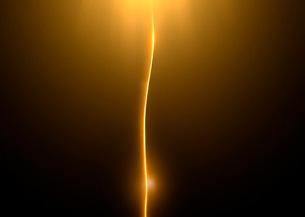
Rabbi Yechiel Weisz
Join us as we discover the rise and fall of Israel’s kings, in a journey through faith, power and prophecy, exploring the legacy of the First Temple and the fate of a divided kingdom. Tuesday nights at 9pm - Zoom ONLY https://us02web.zoom.us/j/4384794610

for
Schedule appointment: +972-(0)2-563-6265
Visit Us :

meal (seudah). It is an oddity that the Sages did not include a festive meal as part of Chanukah’s observance.
Rav Kook offered a novel approach to explain this peculiarity. Judaism recognized that there were certain positive elements in Greek culture that should be embraced. Advancement in science and an appreciation of aesthetics are two illustrations of secular wisdom and culture which can greatly enhance a Jewish way of life.
In a similar vein, Rav Kook’s beloved mentor, the Netziv of Volozhin suggested that the seven branches of the Menorah that stood in the Temple symbolize all forms of wisdom. The middle stem of the Menorah represents the wisdom of Torah and the three branches on each side represent other forms of wisdom (Haamek Davar, Parshat Be’haalotcha, opening comment).
Therefore even in the clash with Hellenism the Sages still taught that it is fitting to incorporate certain aspects that are enhancements from other cultures and wisdoms.. “May the beauty of Yefet reside in the tent of Shem” (Bereshit 9:27). Indeed, this blessing of Noach was interpreted by the Sages of the Talmud (Megillah 9b) as Greek culture which contained elements of beauty - which must be placed in the service of the spiritual truths of Shem, otherwise it can be very harmful. (Moadei Haraya, pp. 182-183)
Rav Kook argued that the reason a festive meal was not incorporated as a mitzvah of Chanukah was due to the fact that it could have easily been misconstrued as Judaism adopting this particular segment from the Greeks as well. Let there be no confusion. The overindulgence and gluttony of the Greek feasting has no place in the spiritually elevated domain of Jewish life.
The Jewish nation is exceedingly precise in
Diamonds, Gems, Precious Stones, Jade, Carvings, Fine Mineral Specimens, Etc.
*** Alan Sussman, “The Collector” *** 052-854-4504
Please call live, Text message or WhatsApp

selecting which areas we embrace from foreign cultures and conversely which secular ideas and practices are entirely unwelcome in our sacred and elevated way of life. (Ain Aya, Shabbat 21a, p.66, #13).

Rabbi Goldscheider’s most recent OU Press Publication, “Torah United” on the weekly Parsha, can be ordered directly from Rabbi Goldscheider at Aarong@ouisrael.org at a special price for Torah Tidbits readers.
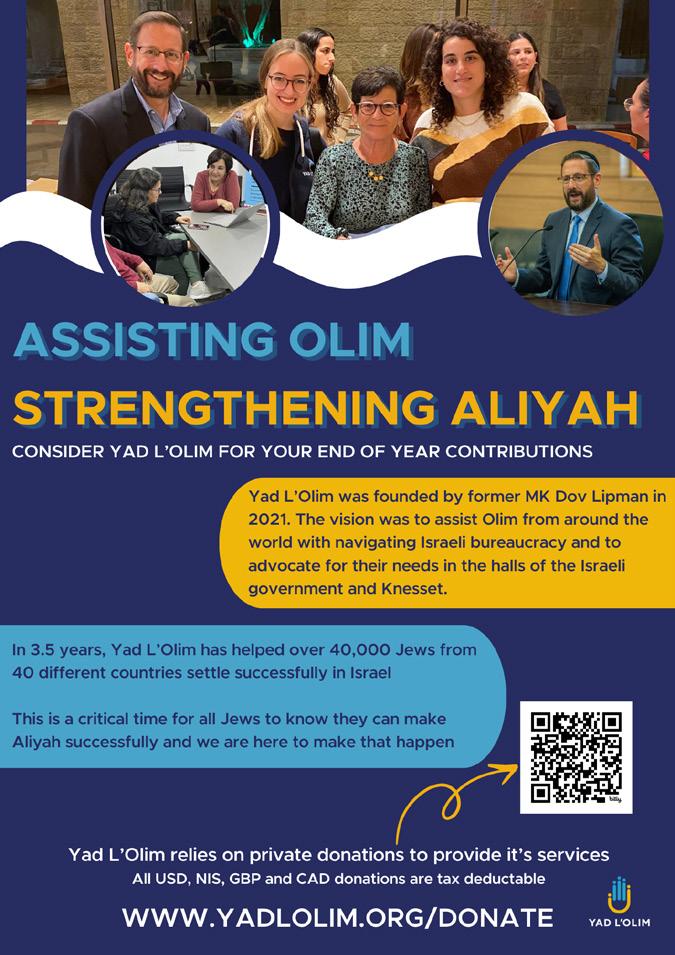


RAV DANIEL MANN
Rav Daniel Mann
Question: We have to leave the house around 15 minutes after Chanukah lighting and plan to return around 10 PM. Ideally, I would want to extinguish the candles (we light inside) for safety as we leave. Can I do so? Should we light at that time, or is it better to light when we come home?
Answer: The degree to which the presumption of needing a half hour of lighting is correct is central to this question. On the one hand, if the lights go out within this time, it is not necessary to relight them (Shulchan Aruch, Orach Chayim 673:2), which implies that the act of lighting is the important thing, not the light’s longevity. On the other hand, when lighting, we must have enough oil to last a half hour (Shulchan Aruch, OC 675:2), and if one lights in

a place where the wind will blow it out before the end time, it is like not putting in enough oil (Magen Avraham 673:12; Mishna Berura 673:25). These halachot imply that the time lit is important. The explanation is that the lighting has to be done with the ability to last a half hour, but it is not critical that it actually lasts. What happens if there was physical potential for half an hour but human intervention after the lighting was done shortens the duration?


The Rashba (Shut I, 539) says that if one accidentally extinguished the light early, he does not need to relight it. From here, the poskim diverge. Some (including the Pri Megadim, MZ 673:2; Avnei Nezer OC 503; simple reading of the Shulchan Aruch, OC 973:2) say that if one purposely extinguished the candles, he needs to relight them. A minority posit that even if one extinguished them purposely, one still fulfills the mitzva and does not have to relight them (see S’fat Emet, Shabbat 21b). Some understand that while one has to relight them, he might still have fulfilled the mitzva beforehand, as evidenced by the machmirim (including the Pri Megadim) who say that when relighting, one should not make a beracha (see Minchat Shlomo II, 51).
Some say that while even intentional extinguishing may not uproot retroactively the mitzva that was ostensibly fulfilled at the
Eretz Hemdah, the Institute for Advanced Jewish Studies, Jerusalem, is headed by Rav Yosef Carmel and Rav Moshe Ehrenreich, founded by Rav Shaul Yisraeli, zt”l, to prepare rabbanim and dayanim to serve the National Religious community in the Israel and abroad. Ask the Rabbi is a joint venture of the OU, Eretz Hemdah, and OU Israel’s Torah Tidbits.

time of lighting, it is qualitatively worse when one lit with the intention to extinguish them within the half hour. Minchat Shlomo (ibid.) compares it to one who physically performs a mitzva but has in mind not to fulfill the mitzva. Others compare it to not having enough oil (see Divrei Sofrim, Chanukah p. 126). Several grounds upon which to say that one fulfills the mitzva include the following (see Nitei Gavriel, Chanukah, Shut 1). Not all distinguish based on the original intention; there may be conflicting opinions in the gemara (Shabbat 21b) on whether there is a minimum time for the candles to be lit, especially if we light inside. These points are particularly important when there are no alternatives (see ibid.).
The point, though, is that you have many potential alternatives. We will start with the more technical. 1) Arrange a “flame-sitter” for the remaining needed time. 2) If (for you to determine) you can safely leave lit candles (at least one), you almost certainly fulfill the mitzva and definitely if they are visible by others. 3) Light the candles outside that night. 4) Light when you come home – in many places, 10 PM is valid for lighting candles, due to late traffic

nowadays. Even if it is too late for public pirsumei nisa, most poskim (see Mishna Berura 672:11; Living the Halachic Process IV, D-7) allow lighting when you come home with a beracha for people who light inside. There are clear preferences to lighting at the standard time, for a few reasons, (z’rizin…; opinions that afterwards it is too late; issues with eating before lighting – see Mishna Berura 672:10). However, it is more important to embrace the greater chance to fulfill the mitzva later than to light at the correct time and plan to extinguish it early. (The halachically creative can contemplate plans of action that include “fancy footwork,” which likely include positive and negative halachic consequences. This is not the proper forum to specify or analyze them.)

537-9626 beitdin@eretzhemdah.org

The economist John Kenneth Galbraith once commented that the definition of a true philosopher is someone who can defend two polar opposite theories and be comfortable with Galbraith was on to something, but he was preceded by Chazon Ish.
In the chronology of Jewish history, Chanukah is the last of the Moadim/festivals. This in fact is its uniqueness. There can only be one concluding festival.
In a letter, Chazon Ish comments on the qualifications of a Navi. He quotes Rambam for example who states that Nevu’ah can only be received and transmitted if the prophet is b’simcha. Remarkably that means, comments Chazon Ish, that when Yirmiyahu wrote Eicha he was b’simcha! This counter-intuitive reality highlights the fact that a person has the capacity to live with two contradictory qualities and function comfortably with both of them simultaneously.

Maharal points out that the unique feature of this festival defines its essence. The Holy Days and their attendant miracles are chronological rungs on a ladder that bring us closer to perfection of the final redemption. One would assume therefore that Chanukah being the last festival miracle in time, the pinnacle should be designed with a sense of permanence. The final step to perfection. That being so, the Rambam’s presentation of the historical backdrop of Chanukah is very strange. In the very first Halacha, (Yad Hilchot Chanukah 3:1) he records that after the miracles of victory Klal Yisrael enjoyed the grandeurs of malchut for more than 200 years, until the destruction of the Beit Hamikdash. Chanukah’s final revealed miracle was very temporary, not permanent!
This is the “icing on the cake” The last frontier of the perfection of redemption?

In fact a careful reading of the first and second chapters of Rambam’s Hilchot Deot will reveal that this is the proper understanding of the Golden Mean, the middle path in exercising character traits. Contrary to the generally accepted understanding of this central motif that this “middle road” is “moderation” in the classic sense ( not extremely arrogant yet not extremely humble, but somewhere in the middle). Rabbi Menachem Mendel of Kotzk was known to say “A horse walks in the middle of the road not a Jew”.
How do we explain this? What is Hakadosh Baruch Hu telling us?
Everyone loves a wedding. The dramatic conclusion of the chuppa ceremony is the last of the Sheva Brachot based on a prophecy of Yirmiyahu while in prison (33:10,11). It is a promise of redemption and the return to Eretz Yisrael when we will hear the
The sound of joy, gladness groom and bride
And the fifth sound “
A proper analysis of Rambam’s halachot will reveal the true understanding of the Golden Mean.
the sound of people praising Hashem…. Who is good, His mercy allows us again to bring offerings to the Temple and the return of the captivity to Yerushalayim”. The Rabbis adopted this prophecy as the climax of the chuppah ceremony. There is one glaring problem. The last “kol” sound was edited םינתח
The sound of the simcha of a wedding.
He can also exercise extreme humility and an embracing love
It is not about a constant positioning “in the middle “Deot is about being in total control of one’s emotions. True success
Rav Yehuda Amital asks what license did Chazal have to change the words of the prophet? The fifth “kol” is the promise of perfection. The unmistakable goodness of the G-d of Israel, the return of the people to Eretz Yisrael with the Beit Hamikdash and all of Taryag Mitzvot reestablished: perfection. Why edit this and substitute it with the sound of a Jewish wedding?
Perfection is the enemy of the good. The perfectionist is the unhappiest person on earth because it’s never good.
The approach of the End of Days is not perfect. The Almighty expects us to partner with Him and to appreciate what we do have in this imperfect world. To celebrate weddings representing the confidence in the security of the
Jewish future. We lovingly embrace Torah and mitzvot. Our partnership will bring about the desired result. The Chanukah miracle reminds us that the trials and tribulations we experience are also temporary challenges.
Today we are devastated by the October 7 kedoshim, the ravages of war and the displaced and homelessness, death and suffering of hostages, the loss of hundreds of our holy soldiers and world-wide antisemitism. We must see all of this as temporary. This is the Chanukah moment. We must celebrate with faith that Hakadosh Baruch Hu will without a doubt come through as He always has, but in order for that moment to come we have to do ours.
Do you have a life insurance policy you:
• No longer want?
• No longer need?
• Can no longer afford the premium?
• Could you use extra money instead of keeping your policy?
I can guarantee that if you qualify with the underwriting process I can get you more money than if you cash it in with the company.
Please contact Moshe Russell at: Buymypolicy32@gmail.com








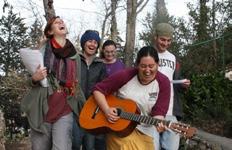
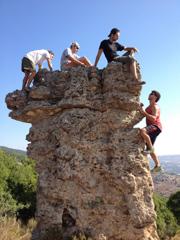
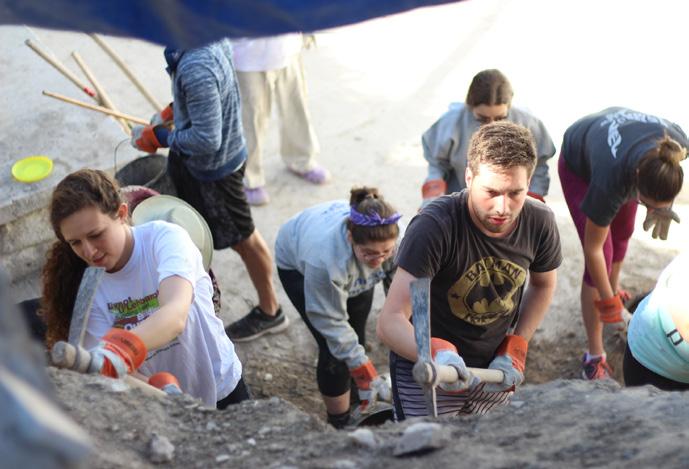
Livnot U’Lehibanot launches new 1 and 2 week long volunteering programs, starting every Sunday, geared to 21-40 year olds* in Israel's Southern & Northern Border Communities including Kiryat Shemona, with 250+ projects already completed in 32 communities. Our program includes hiking, 3-4 hours of educational programming every day and group discussions to explore our connection to Eretz Yisrael and Am Yisrael.


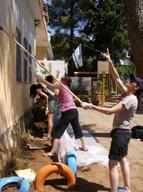
come explore ou campus ancient tunnels and workshops this Hannukah as
continue
efforts to bring the hope of the past into our present and realize the dreams of Achdut and Tikkun Olam in Am





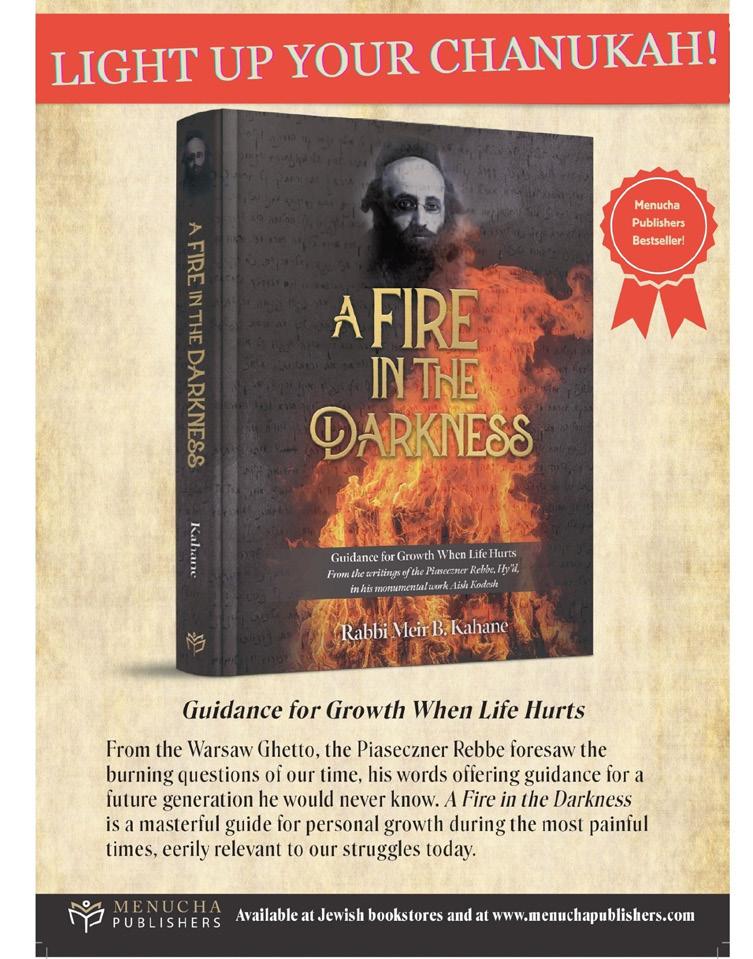

Sarah asks: My friend has been dating a guy for some time. She is very into him but isn’t sure how he feels or how serious he is about the relationship. What is the best way to prompt this conversation without spooking him?
Aleeza answers: Great question, Sarah. Let’s unpack this together.


Old Katamon 7,500,000 NIS
190 SQM on one level
Orit 050-3362306
Baka 3,290,000 NIS
3.5 R building after Tama Nahum 050-7225694


Arnona 4,300,000 NIS
2 apts of 100 sqm, can be connected, 1st floor, accessible Nahum 050-7225694
Old Katamon 4,500,000 NIS
3R garden apartment Rachela 052-6503348

First, it’s important to recognize that if he’s still saying “yes” to spending time together and consistently shows up, that’s a strong baseline indicator that he’s interested. A man who isn’t interested will typically either end things or clearly distance himself. His actions—showing up and continuing to date her—show he sees value in the connection.
That said, if he hasn’t shared how he feels or how serious he is, it’s likely because he doesn’t know yet. He knows enough to keep moving forward, but he may still be figuring out if this relationship is “the one.” And that’s okay - these things take time.
The key here is for your friend to approach this conversation in a way that feels natural and non-threatening. I like to think of relationships as unfolding in three stages: past, present, and future.
At the start of a relationship, conversations often focus on the past—how we grew up, our families, and our life experiences. As things progress, the focus shifts to the present—what’s happening now and who we are today. By the middle phase of a relationship, it’s time to start talking about the future.
This doesn’t mean diving into a heavy “what are we?” discussion. Instead, it’s about gently exploring future goals and visions to see if there’s alignment. Your friend can bring this up in a natural way by asking open-ended questions like:
“What kind of life do you imagine building?”
“Where do you see yourself in a few years?”
“What’s important to you in a long-term relationship?”
These questions open the door for meaningful conversation without adding pressure. They help both people assess if they’re heading in the same direction, at a similar pace.
It’s also worth reminding your friend that his ongoing presence signals he values the relationship. His hesitation to express himself might simply reflect his process of gaining clarity.
Encourage her to be patient, curious, and confident. When approached with openness and calm, these conversations can bring both clarity and deeper connection.
Wishing your friend success in her journey.
Founded in Israel in 2019 and led by Rav Rimon, Shagririm Balev - a social online matchmaking initiative - has taken the dating scene by storm. With over 10,000 candidates and 3,000 Ambassadors, in Israel and the US, Shagririm Balev is averaging a Wedding every 2 days!
Want to set up your friends? Become their ambassadorjoin

0585323242





RIVI FRANKEL TORAH TIDBITS CONTRIBUTOR
Like many of you, I moved to Israel because I wanted to live where our national history occurred. And for the two miracles that we commemorate on Chanukah, the location of “Po” is easily identifiable. The small jug of oil was found and used in the menorah in the Beit HaMikdash, the holy site which remains central to Jewish practice and identity despite thousands of years of exile.
The second Chanuka miracle, the Macabees’ victoriously fighting a war against the formidable Selucid Greek army, can also be pinpointed on a map. Ma’ale Levonah, Beit Horon, and Elazar are among the battle sites listed. Researcher and expert tour guide, Zeev “Jabo” Erlich, HY”D, mapped out a tour route that follows, south to north, what he identified

as the eight battles of Yehuda HaMacabi.
However, the site where the rebellion began, ancient Modiin, where Mattisyahu HaCohen rallied the “troops,” has some debate as to its exact location. The gemara (Psachim 93b) places Modiin at 15 Roman miles from Jerusalem. Rabbi Akiva names it as a marker in the discussion of what constitutes a far journey, and it is recorded again in the discussion of distance regarding who is obligated to be oleh l’regel.
With numerous mentions in Mishnaic and Talmudic literature, Modiin is also found in both books of Maccabees and Josephus.
The Madaba map also includes ancient Modiin. Found on a Byzantine church floor in Madaba, Jordan and used by Chrisitan pilgrims coming to Jerusalem, it has helped archaeologists locate and identify various places throughout the region.
For centuries there have been sites suggested to be the location of ancient Modiin. Options include Tel er-Ras, Hirbet el-Hammam, and Givat Tittora. Of the “potential ancient Modiins,” my personal favorite to visit is Um el Umdan, adjacent to modern Modiin’s Buchman neighborhood. It is easily accessible, and has many interesting remains, including an ancient shul.
Ben Maimon, 4 rooms, 113m, 2 bathrooms, porch, 1st floor, elevator, 6.2 million NIS
For Sale: Baka garden apartment with private garden, Arab house - special & full of magic, original flooring in excellent condition, 114m, 4 rooms includes one ensuite, water pit in tabu, a/c
Price: 5,100,000nis � Trust Properties
Smadar 050-3114040 // 02-642-4329
For more details - Smadar 0503114040
smadi_bida@walla.co.il
The name Um el Umdan, originally thought to be connected to the name Modiin, has since been linked to the ancient shul that stands in the village. Meaning ”mother of columns,” this name is used to reference other places in Israel as well, and likely refers to the columns in the center of the shul.
The shul features many typical structures
number is 157,600. The total count of the army age men is 603,550 without the tribe of Levi.
The people travel and camp with the Mishkan in their midst. Physically and metaphorically. We travel our history with G-d in our midst. While the distinct feeling you get in the detailed description of where each tribe encamped is the feeling of an army encampment, there is another layer of meaning. Yes, regimented. Specific. Detailed. Organized. But an army for which purpose? To fight the anticipated foes in the Land of Israel? Or to be the army of Hashem? A fighting army with its G-d in its midst? Or both?
of Second Temple Batei Knesset that we have discussed in previous articles. Stone benches, columns in the center, and a stone base where the Torah would be read from. Most of the visible remains date to the Herodian period and were destroyed during the Bar Kochva revolt. But underneath lie ruins of an even earlier synagogue dated to the period of the Hashmonaim. Houses were found next to the shul, some even two stories high, hinting the community was wealthy. Olive and grape presses were found nearby, and a mikva where people would immerse before handling the wine and oil production. In light of the source in Mishnah Chagiga 3:5 that says that pottery made in Modiin could be relied upon as being רוהט we see that ritual purity was taken seri- , ously there.
.ילא ’הל ימ
It’s not just a call of the past that echoes through the ancient village of the Macabees. It’s an anthem sung throughout history, from Moshe to the Maccabees to Jews in 5785.
We don’t just get to live in the land where it all happened, we get to be active participants in writing the next chapter.
4th aliya (3:1-13) Aharon’s sons’ names were Nadav, Avihu, Elazar and Itamar. Nadav and Avihu died without children. Elazar and Itamar serve as Kohanim with Aharon. Take the Leviim: they are to serve Aharon. The Leviim are responsible for the Mishkan: to support the Kohanim and the people, to facilitate the running of the Mishkan. The Leviim shall take the place of the first-born, who became obligated to me when saved in Egypt.
And just as in Modiin, where the people who followed the call merited both a military miracle and the blessing of light, may we be victorious in vanquishing evil and may the light of Israel continue to shine brightly.
Rivi Frankel is a sought after licensed tour guide in Israel for groups, families, and individuals of all ages. She is a Tanach lecturer, has run educational programing aroud the world, and currently lives in Jerusalem.
There are 2 groups mentioned here: Kohanim and Leviim. The lineage of the Kohanim is given. It just doesn’t take much room. Because Aharon is a Kohen and his sons. But he only has 2. So the entire lineage of the Kohanim is 3 people. The Leviim, on the other hand, are an entire tribe,
Every person who was not born in Israel and lives in the Holy Land should celebrate his/her ALIYANNIVERSARY annually!
REMEMBER! WITH ALIYAH BLESSINGS! The NEAMANS
descendants of Levi, son of Yaakov. Their lineage, at quite some length, is given in the next aliya.


5th aliya (3:14-39) Count the tribe of Levi by households, from 1 month and older: the households of Gershon, Kehat and Merari, the sons of Levi. The sons of Gershon, Kehat and Merari are listed. Gershon’s family, from a month and above, is 7,500. They camp to the west of the Mishkan. Their task was to transport and be responsible for the curtains and coverings. Kehat numbered 8,600, camping to the south. They were responsible for the vessels: Aron, Menorah, Table, altars. Merari numbered 6,200, camping to the north. Responsible for the structure of the Mishkan; the walls, supports and beams. The total of the tribe of Levi is 22,000. On the front side, the east of the Mishkan, Moshe and Aharon and families camped.
The encampment around the Mishkan had 2 layers. The Leviim were in close, on 3 of the 4 sides of the Mishkan. The 4th side, the leading side, had Moshe and Aharon. The entire 12 tribes were farther removed on all 4 sides.

The 3 sons of Levi were family groups; Gershon, Kehat and Merari. They had full responsibility for the Mishkan. Their tasks fell in categories. Gershon; textiles. Kehat; furniture. Merari; building. Gershon took care of the curtains and coverings. Kehat, the important main vessels of the Mishkan. And Merari the structure of the building. 6th aliya (3:40-51) Count all the firstborn of the age of a month and above. The Leviim are to replace the firstborn. There were 273 more
“These photographs are of the ancient Beit Knesset on the edge of the neighborhood where I live. I took these photos not long after making aliyah (we are here 15 years). There was an excavation done a few years back and the archaeologists strongly believe this to be the Beit Knesset of the Maccabees. Every year on Kabbalat Shabbat Chanukah, about 200 of us from the neighborhood daven together on the floor of the ancient Beit Knesset. It is a most meaningful gathering”. - Photography and explanation by Howie Mischel.
To learn more see: modiinapp.com/en/page/1401/umm-el-umdan and: en.wikipedia.org/wiki/Umm_el-Umdan


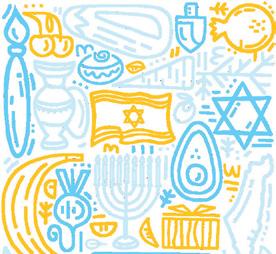
DECEMBER 29TH | 17:00-21:00


JANUARY 1ST | 14:30-17:30

BOTH



BY RAKEL BERENBAUM C ontributor, Torah Tidbits
RAKEL BERENBAUM CONTRIBUTOR, TORAH TIDBITS
Our parsha begins with God telling Moshe to tell Aharon’s descendents, the Kohanim, that they are prohibited from becoming tamei – impure. They must not participate in the burial of most dead people “lnefesh lo itama b’amav” (21:1).
Michal Silverstein, MS
Olives themselves are very bitter and require a lot of work to make them fit for human consumption. Olives, of course, are also used to make olive oil, which was used in the Beit Hamikdash for numerous things such as kindling the lights of the Menorah, for the korban mincha, and for anointing a Kohen or King.
Chanukah usually falls out in the calendar after the olive harvest. This year, many Israeli farmers desperately sought volunteers to help pick their olives. The long war has left them without Arab or Thai workers, so they are dependent on the good-hearted tourists or natives who travel to help them. Whether the volunteers pluck the olives by hand or shake or bang the tree with a stick to get the olives to fall on the net, the farmers are always very appreciative. (Anyone who hasn’t had an opportunity yet to help farmers—I highly recommend it. It is really an honor to meet the hardworking farmers, and the farming work is both meditative and invigorating. There might even be places still looking for help to pick their olives during Chanukah -making a nice outing with the family).
We all know that dealing with the dead is a very important mitzvah of chesed so much so that the person who is occupied in burying the dead is exempt from other mitzvoth even from wearing tefillin, saying Shema and davening. It is one of the ways that we follow in the footsteps of God and do the mitzvah of ‘Vhalchta bdrachav” (Dvarim 28). So it seems strange that the Kohanim would be prohibited from such an important mitzvah.
One reason is that the Kohanim need to remain pure so that they can do their important work in the Mishkan or Temple. Coming in contact with the dead would make them impure and then they wouldn’t be able to enter the Holy places and wouldn’t be able to do their work – so when there are other people who could bury the dead person it is best if they do it.
Specializing in Har Nof properties
FOR SALE - EXCLUSIVE!
Shlav A! 5 rooms, 150m garden, private entrance, 4,750.000NIS, flex.
SHLAV A! 4 room, 98m, very spacious with large salon, 3.050.000NIS, flex., for a quick sale!!
Gila Gershenfeld - 058-7661653 gilagersh11@gmail.com | gilaagency.com
The Oznaim LTorah brings another reason. He says it is important for people to
Most of the olive’s oil is stored in the pit so it is also not a simple process to extract the oil. Therefore in the time of the Chanukah story, when the Beit Hamikdash had been defiled by the Greeks and the Hasmoneans only found a small flask of pure oil, enough for one day, they would have had to wait a while till they could make new pure olive oil. But there was a miracle, and that small bit of oil actually burned for eight days.
The other miracle of Chanukah, as we recount in the al hanisim prayer, was on the battlefield – where God delivered “the strong into the hands of the weak,…” While the Hasmoneans fought bravely against the Greeks, their other battle was against the hellenists/ mityavnim, Jews who believed that we could mix with non-Jews and could bring Greek culture into our holy places. The Hellenists tried to blur the boundaries between our nation and culture and those of the Greeks surrounding them (see Macabim 1, chapter 1). The Hasmoneans fought to save Jews and Judaism. These battles continue today; physically, on numerous fronts, and spiritually with modern day “Hellenists”. Chanukah reminds us of how different we are. We do not want to sink into the surrounding nations. We want to keep our
care for the dead and to go to the home of a mourner because all mortals will die one day and that way we can remind ourselves of our end and improve our behavior. He says that the Kohanim don’t need this reminder because they are always living in the shadow of death. Their job puts them on the tight wire between life and death every day since they work in the presence of God. If they come to the Holy areas to do their work in inappropriate ways, ( such as drunk, impure, without their special garments, without washing their hands and feet…) the punishment is death. This we saw with the death of the two son’s of Aharon, Nadav and Avihu, “b’kirvatam lfnei Hashem” (10:1). They live with a constant threat of death so they are more apt to be careful with their behavior. Yet there are a few exceptions to this prohibition, when the Kohanim are actually obligated to deal with the burial of a dead person, such as for the very close relatives that are listed in verses 21:1-3 and for a dead person who has no one else to bury them. There are times in everyone’s life, even the Kohen’s, when they are confronted with death and they must rise to those occasions as well. The Rambam learns from these verses the general mitzva for all Jews, not just kohanim, of aveilutmourning. The Torah does not want us to ignore tragedies that may befall us. Crying and mourning are normal stages when
Jewish beliefs, mitzvoth and culture.
As we read in the Gemara (Shabbat23a) “Just like oil cannot mix with other liquids, so too Israel ‘And I will separate you from the other nations’, Just like oil rises above [other liquids], so too Israel “and God has made you above’” .
In our house we light a chanukia with glass cups filled with water at the bottom and olive oil on top, so every Chanukah we witness this lesson - the oil separating from and rising above the water no matter how we place it. It’s a beautiful image of the help that God gives us in all our battles. Chanukah Sameach!
Sorry no recipe for sufganiot, latkes or other fried Chanukah delicacies. I chose this focaccia recipe instead. It contains a lot of olive oil, and can be eaten dipped in olive oil or any of your favorite dips. I suggest putting out bowls with different types of olive oil to taste the difference.
• 3 cups whole wheat flour
• 2 teaspoons instant yeast
• 1 teaspoon sugar (or honey)
• 1 1/2 teaspoons salt
• 1 1/4 cups warm water (around 110°F / 45°C)
• 1/4 cup olive oil (plus more for on top
• Toppings: Zucchini, red pepper, cherry tomatoes, green or black olives, onion, carrot, garlic, scallions, sea salt, or any herbs you like, sea salt. Preheat the oven to 200°C. In a large bowl, combine the flour, yeast, sugar, and salt. Add warm water and 2 tablespoons of olive oil. Mix with a wooden spoon or your hands until a sticky dough forms. Knead the dough on a lightly floured surface for about 8–10 minutes until smooth and elastic. (If the dough is too sticky, you can add a bit of flour or if it’s too dry, add a teaspoon of water a bit at a time.) Place the
dough in a greased bowl and cover with a damp towel or plastic wrap. Let it rise in a warm spot for 1–1.5 hours or until doubled in size. Grease a baking sheet or a 9x13-inch pan with olive oil. Transfer the dough to the pan and gently stretch it to fit. If it resists, let it rest for 5 minutes, then stretch again. It should fill the whole pan and be an even thickness all the way across. Cover the dough loosely and let it rise for another 30 minutes. Remove the dough from the warm place and use your fingers to poke deep holes into the dough press right down to the bottom of the pan. Gently brush 1-2 tablespoons of olive oil over the surface of the dough. Arrange the vegetables and herbs on the surface of your focaccia into a menorah picture. Press the vegetables into the dough. For the candles I used green beans or zucchini sliced like rectangles. For the flames I used cherry tomatoes halved, or red pepper sliced like little diamonds. For the chanukia base I used onions or very thin carrots. Use whatever you like or what you have handy. Brush everything with another 1-2 tablespoons of olive oil and sprinkle with a bit of salt (optional). Bake for 20–25 minutes until golden brown. Remove from the oven and drizzle with a bit more olive oil while warm. Let it cool slightly before slicing. (You can substitute white flour for some or all of the flour for a softer texture.) You can make more focaccia’s with other Chanukah designs such as :a dreidel, magen david , oil jug…
Mature woman with medical backgroud wishes to keep an older woman company, sleep over in her house, do some healthy cooking and laundry for her.
References available Fluent in English & Hebrew Call Esther - 052-335-6139

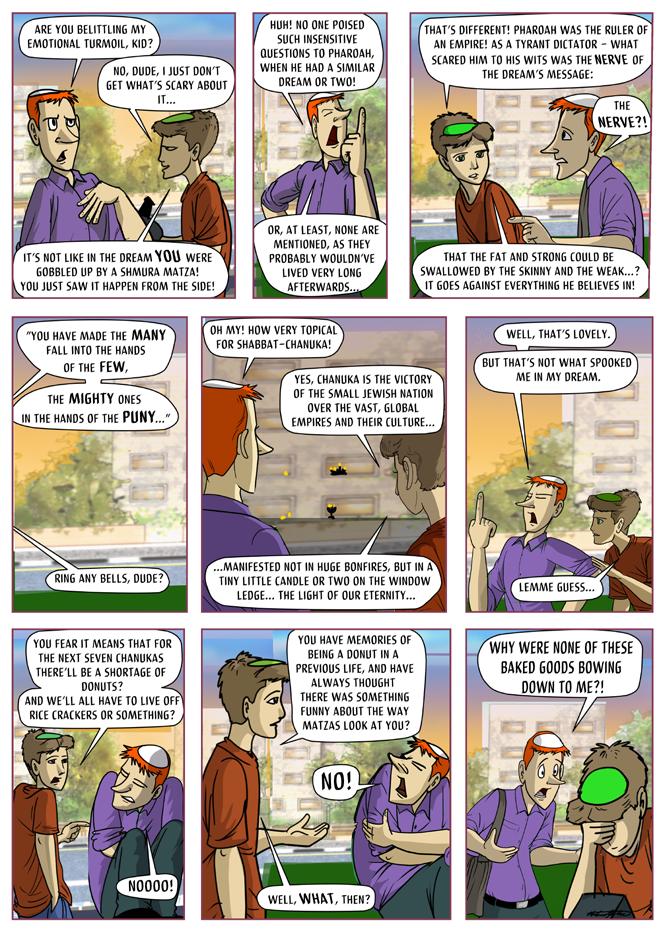


This Dvar Torah is a summary from a chavrutah between Tessie Krebs, Yachad Bat Sherut and Zalman Feiglin, oleh from Melbourne and Jerusalem chapter participant.
In this weeks Parsh, we continue with the story of Yoseph, highlighting his rise from prison to power, but it also briefly introduces his two sons, Menashe and Ephraim, born to him by his Egyptian wife, Osnat. This seemingly minor detail holds significant meaning and invites deeper reflection.
Yoseph’s transformation from a slave to a ruler in just 13 years is remarkable. The Torah’s mention of his children, Menashe and Ephraim, suggests they were extraordinary, particularly in their relationship with their grandfather Yaakov. Yaakov saw them as his own sons, declaring, “Your two sons... they are mine.” This is why Menashe and Ephraim are counted among the 12 tribes in place of Joseph.
While many commentaries explore the significance of their names, we wanted to focus on a teaching from the Rebbe, which touches on Yoseph’s resilience through hardship. As discussed in Parshat Vayeshev, Yoseph’s traumatic experiences—being betrayed by his brothers, sold into slavery, falsely accused by Potiphar’s wife, and imprisoned for years—could have led to despair. But Yoseph responded with unwavering positivity, continually thanking Hashem. His resilience allowed him to rise above his suffering, eventually becoming Egypt’s ruler. How did he maintain this strength? Through his
deep belief that everything, even his suffering, was part of Hashem’s plan.
Yoseph’s choice of names for his sons reflects this worldview. His eldest, Menashe, means “G-d has caused me to forget all my toil.” This doesn’t mean Yoseph erased his painful memories, but that Hashem gave him the strength to set aside his suffering. Like many, Yoseph declared, “Thank G-d, I survived.”
However, the Rebbe teaches that mere survival isn’t enough—we must thrive. Yoseph’s second son, Ephraim, whose name means “G - d has made me fruitful,” embodies this thriving. Yoseph’s message was clear: not only did I survive, but I excelled. I became the ruler of Egypt!
When Yaakov blesses his grandsons in the upcoming Vayechi portion, he places his right hand—the hand of blessing—on Ephraim, the younger son, and his left on Menashe. This was to signify that while survival (symbolized by Menashe) is important, thriving (represented by Ephraim) is even more so.
The Rebbe’s message is clear: surviving hardships is essential, but thriving—growing, contributing, and excelling—is the ultimate goal. This is a lesson we can all carry with us as we strive to live our best lives.
Wishing everyone a Shabbat Shalom!





Dorot Rishonim 3, (off Ben Yehuda) • Tel: 02 563-7155 • www.SherlockSHats.com

CITY CENTER
� 2 rooms, elevator - 1.890.000 NIS
� 2 rooms, Savyon view, luxurious, furnished, Shabbat elevator, concierge2.890.000 NIS
In the heart of calm and pastoral BAKAPrivate arab house, 6 rooms, 500m + possibility of building 250m, huge garden, approx. 700m, completely renovated, underfloor heating + a/c, large parking, 5 bathrooms, 5 toilets, green
MENDEL 0528980111
MENDEL 052-8980111
GERMAN COLONY
BAKA - New penthouse, 4 rooms in a small luxurious building with character, alone upstairs, 3rd floor + elevator, 4 orientations, 3 toilets, 2 bathrooms, terrace / sukkah, 70m, parking, store-room
House, 7 rooms, 260m + 175m private garden + 100m terassa, calm and pastoral, parking, storage
18.200.000 NIS MICHAEL 052-3202488
5450000 NIS MENDEL 052-8980111
BEIT HAKEREM - New building, very luxurious, 5 rooms, easy access
MOSHAVA / In a building after TAMA 38, new apartment, 4 rooms, 3rd floor + elevator, balcony/partial sukah, opened sight, 2 bathrooms, calm, parking
10.000.000 NIS MICHAEL 052-3202488
GANEI KATAMON - Garden apartment, 110m + large 370m garden, 30m terrassa, elevator, storeroom and parking
MENDEL 052-8980111
BAKA / MEKOR HAIM - 4 rooms, 90m, 2nd floor + elevator, completely renovated, fireplace, a/c, gas heating, very central, close to all amenities
9.000.000NIS MENDEL 052-8980111
MENDEL 052-8980111
Near Arnona Hatzaira, in a step building, very








Ignite